How to Put Your College Major and Minor on Your Resume
How to Put Your College Major and Minor on Your Resume | Tips & Examples
Quick Navigation

Should you list major and minor on your resume?
How to put major and minor on a resume, major and minor resume examples, tips for adding your major and minor to your resume.
Students often choose both a major and a minor area of study when they are in college. Knowing how to add your college major and minor to your resume can help make your education section stand out to recruiters and hiring managers. This article discusses how to list your college major and minor on your resume with tips and examples to guide you.
There are several reasons you should list your college major and minor on your resume. If you are a current student, recent graduate, or a candidate with limited relevant work experience, including a detailed education section in your resume can help your resume stand out. If you are a professional with a significant amount of experience, you can still list your major and minor on your resume to highlight expanded knowledge in your field.
However, while you should typically include your major, consider whether your minor is relevant to the job. It may be better to omit the minor if it has no relation to your career.
Follow these steps to list your college major and minor on your resume.
1. First, create an education section
Add an education section to your resume by creating a separate heading. Suppose you are a recent graduate or have limited relevant work experience. In that case, put your education section near the top of the resume before your experience section. For professionals with more relevant work experience, put your education section below the experience section. Additionally, your education section should include the name of the college or institution you attended, its location, the degree earned, major and minor, and the dates you attended the school.
2. Next, begin with your most recent educational experience
Begin the education section with your most recent academic experience, even if you are a current student. The number of entries may vary depending on the types of degrees, the relevancy of each degree to the position you are applying for, and the amount of relevant work experience you have.
For those with a bachelor’s and master’s degree, you can include both degrees in your education section and begin by listing your master’s degree first. For those with a bachelor’s degree, you can list the degree and some relevant work experience. And, if you have an associate or technical degree and limited work experience, you might choose to list both your college and high school experience, beginning with your college degree.
3. Next, add your major first
The first line of your education section should list the name of the college or institution you attended and its location. Include the dates you attended on the first line, though you can also put them at the end or justify them to the right of the page. The next line should begin by identifying the degree you are pursuing or earned, followed by your declared major. For example, you could write ‘Bachelor of Science in Mathematics.’
4. Finally, determine whether or not to add your minor
Decide whether including your minor in your resume adds value to your application. You want to keep your resume clean and straightforward to ensure that employers see your most important hiring qualities. Only include your minor if it is relevant to the position you are applying for and adds value to your qualifications. And, if you include your minor, place it on the same line as your major, separated by a comma, or on a separate line below your major.
Use the following examples to guide you when listing your college major and minor on your resume.
Example of college major without a minor
Here is an example of an education section that lists only your major.
Arizona State University , Temple, AZ Bachelor of Science in Elementary Education 2015 – 2019
Example of a double major
Here is an example of an education section that lists a double major.
University of South Florida , Tampa, FL Bachelor of Arts in English and Marketing 2015 – 2019
University of South Florida , Tampa, FL Bachelor of Arts in English Bachelor of Arts in Marketing 2015 – 2019
Example of a college major and a minor
Here is an example of an education section that lists both a major and a minor.
University of Southern California , Las Angeles, CA Bachelor of Arts in Psychology, Minor in Health Sciences 2015 – 2019
University of Southern California , Las Angeles, CA Bachelor of Arts in Psychology Minor in Health Sciences 2015 – 2019
Example of a double major and a minor
Here is an example of an education section that lists a double major and a minor.
University of Houston , Houston, TX Bachelor of Arts in Psychology and Law, Minor in Communications 2015 – 2019
University of Houston , Houston, TX Bachelor of Arts in Psychology and Law Minor in Communications 2015 – 2019
Example of education section with additional information
Here is an example of an education section that lists a major and minor with additional supporting information.
Michigan State University , East Lansing, MI, 2015 – 2019 Bachelor of Arts in English, Minor in Marketing GPA: 3.75/4.0 Relevant Coursework: American Literature, Literary Theory, Nonfiction and Creative Writing, Consumer Behavior and Digital Marketing
Here are a few general tips to remember when adding your college major and minor to your resume.
Read the job description
The job description often includes specific education requirements the employer is looking for in qualified candidates, such as a particular type of degree and major or minor. Reading the job description can help you determine which information about your educational experiences is most relevant for the position.
Consider including supporting information
Besides including information about the school you attended and your degree, you can also include other relevant information in your education section, such as GPA, specific coursework, honors, and achievements.
Use consistent formatting
Don’t forget to maintain consistent formatting throughout your resume. Make sure to format your education section in the same way you format your work experience, including using the same fonts, sizes, colors, style, and headings for each section.
Add your major and minor to other application documents
Besides adding your major and minor to your resume, you can also include them in your cover letter and personal summary. Listing your major and minor on several application documents can help ensure the recruiter or hiring manager sees this information.
If you need help writing a resume, use our data-backed resume builder .
How to Write a Resume for College – A CollegeAdvisor Guide
How to write a resume for college – introduction.
Standing out as a stellar applicant in the college admissions process is tough. One way to separate yourself from the crowd is by crafting a strong resume for college. Your college resume can highlight information about your background, activities, and achievements. Some of these might not be indicated elsewhere in your college application or recommendation letters .
In this article, we will teach you how to write a college resume. We’ll highlight 5 simple steps to building your college application resume. We will also discuss what a college resume is and why you may need a resume for college. Additionally, we will provide examples on how to write a resume for college by reviewing college resume examples. Finally, we’ll walk you through some college resume templates in our example college resumes.
So, let’s look at how to write a college resume and explain what makes a good college resume, why you should include a resume for college in your applications, and more!
What is a college resume?
A high school resume is typically a one-page document that complements your college application . Your high school resume (or college resume) can help you showcase your achievements and extracurriculars for college. It does this by sharing information that is not elsewhere within your college applications. The goal of a college resume is to show the college admissions officers who you are and how you spend your time outside of the classroom .
Before we jump into how to write a college resume, let’s examine some things that make up a good college resume.
A good college resume should include:
- Clear structure
- Concise language (bullet points over essay-style)
- Relevant details
- Strong formatting
As we discuss how to write a resume for college, you might wonder what purpose a college resume serves. In short, a college resume is a summary of experiences that you can use to add depth to your college applications. You can also think of a college resume as your high school resume, or a resume for college. Your college resume will include a brief description of each of your experiences and extracurriculars for college.
While we examine how to write a resume for college, you should first note that your college resume should include key details like your educational details, GPA , extracurricular activities/jobs, and honors/awards. As we’ll discuss, your college resume will have other key features. We’ll go through each of these as we learn how to write a resume for college.
Many colleges list a college resume within their college application requirements. But, even if a college resume is not listed in the college application requirements, we recommend creating one anyway.
We will look at a sample college resume later in this article, along with a 5-step guide to creating a resume for college that you can use as you begin writing your college resume.
Do I need a resume for my college applications?
No, you do not necessarily need to include a college resume with your college applications. However, a high school resume or resume for college can be a helpful tool in the college admissions process.
So, how could including a resume for college application be beneficial? First, including a college resume in your college applications can help highlight your skills, experiences, and qualifications to the admissions office of your dream school.
Having a college resume can help you showcase your extracurricular activities in your college applications. You can highlight leadership positions, accomplishments, interests, and activities on your college resume that might not appear elsewhere in your college applications.
Creating a resume for college application can also demonstrate your accomplishments and experiences to college admissions officers. Even if a high school resume is optional in the list of college application requirements, including one in your college applications can help you stand out. Standing out is incredibly important in the admissions process, especially if your ideal college is high on the list of college rankings .
It is a good idea to start putting together your college resume as you near the end of high school.
You may forget the names of clubs, supervisors, mentors, teachers, etc. as you get ready to apply to college. So, the earlier you can gather all the information for your high school resume, the better! That way, all of your experiences are fresh in your mind, and you can create the strongest resume for college possible.
When should I prepare my college resume?
As you begin the process of applying to college, you might be wondering when to prepare your college resume. The ideal timeline for creating your high school resume can start as early as 9 th grade.
In general, you won’t want to include anything on your high school resume before 9 th grade. Like other college application requirements, college admissions officers are only interested in the activities you have participated in during high school.
Keep a list starting in 9th grade
As early as 9 th grade, you can start keeping a list of your accomplishments and activities. Even though you won’t need to format this list into a college resume yet, it will be the basis for your future college application resume.
As you begin the college admissions process, you can use the list you created and turn it into a college resume. As you apply to college and prepare your college resume, research which college resume format works best for you. Reviewing a sample college resume or college resume template can help you find the perfect college resume format.
As you look through college resume examples, think about which aspects of the college resume template you like the best. Then, adapt things from those college resume examples to fit your college resume. Once you have decided on a college resume format, list your accomplishments, jobs, and activities within that college resume format.
Summer before senior year
The best time to create your high school resume is during the summer before your senior year. This gives you plenty of time to perfect your college application resume.
We’ll examine the necessary components of a successful college resume in the next section of this article. So, read on!
What should a high school student put on a resume?
As you begin the college admissions process, you may be asking yourself what to include on your high school resume. You can start the college application resume writing process by brainstorming how you spend your time outside of your courses.
Think about everything you have done or achieved since you started high school and write it down. Your high school resume should highlight your activities, interests, and skills. Pay particular attention to these factors as you consider what to include on your high school resume.
Your high school resume will be organized categorically. Some of the most common categories for a resume for college application include personal information, work experience, extracurricular activities, volunteer experience/community service, education, and skills. In addition to the categories listed above, below is a list of some other things that high school students should list on their resume for college.
Top ten things to list on your college resume:
- School name and address
- Contact Info
- GPA or Class rank, if applicable
- Internships & volunteer roles
- Awards and honors
- Extracurricular activities
- Leadership positions
- Language competencies
As we mentioned earlier, you may not have information or experiences for every category listed above. That’s perfectly fine! Focus on what applies to you and what you can include on your high school resume as you learn how to write a college resume.
What does not belong on my high school resume?
Now that we have examined what to include on your high school resume, let’s discuss what does not belong on your college application resume.
Keep it current
In general, you should avoid including any activity or achievement from before 9 th grade on your resume for college. However, it’s okay to include something that is particularly impressive and/or attached to a current activity.
For example, if you have 12 years of experience in playing the violin, you will want to include that on your high school resume. However, if you joined your middle school band for a semester, you should likely leave that out of your college resume. Your resume for college should reflect activities that matter to you now.
Avoid listing daily duties
There is no need to include informal everyday activities on your college resume, such as cooking for your family or cleaning around the house. When you are crafting your resume for college, it’s best to stick to things that are relevant to admissions committees or future employers.
Note that this is one area where your college resume differs from your activities list. For instance, if you spend considerable time caretaking your three siblings, you may choose to include that on your activities list within the Common App. However, the same responsibilities likely shouldn’t appear on your resume for college.
Keep it clear
As you examine college resume templates and college resume examples, take note of the language and structure in a sample college resume. It’s important to use concise language and clear structure throughout your resume for college.
Additionally, do not include excessive text or overly detailed explanations on your college application resume. You want your resume for college to be simple and clear. In general, you should limit your high school resume to one page, or two at the absolute maximum. Most people who review your college resume will spend about 30 seconds with it. So, your resume for college should be easily scanned, above all.
When you use concise language throughout your college resume, it will make it easier for your reader to understand your accomplishments. Because most people will skim your high school resume, having a clear structure throughout will make it easy to read. Keep it simple and keep it consistent.
Steer clear of images and graphics
While you might come across this in your college resume format research, it’s best to avoid including images or graphics in your college application resume. Although this is a new trend and can be seen on multiple college resume examples and college resume templates, it can be distracting and take up valuable space on your high school resume.
For instance, if you volunteered at twelve different soup kitchens, there is no need to list each one separately. That will become tedious and take up too much space on your essential resume for college application.
Finally, you should never misrepresent your qualifications on your high school resume. Be honest about your involvements, however many you have. It’s not worth potentially getting caught in a lie or an exaggeration during a college interview.
Where do I submit my college application resume?
While you apply to college, you might be wondering what to do with your resume for college applications. Many college application portals will include a section for your college resume, especially if a resume for college is listed as one of the college application requirements.
Most college application portals list the high school resume section as optional. While you are applying to college, you might notice that most colleges require that you fill out an activities section as part of the application process. The activities section will ask you to list your extracurriculars for college. Often, your activities section will serve the same purpose as your college resume.
If you choose to include a high school resume with your college application, it should reflect your accomplishments in more detail than your activities section. Additionally, if you choose to include a resume for college with your application, make sure it adds something new to your activities list.
You will receive access to your college’s application portal once you have completed the process of applying to college but before you receive a college acceptance letter and officially enroll . When it’s time to upload your high school resume, be sure to upload it as a PDF rather than a Word document. That way, you can ensure that your formatting of your college resume stays consistent on every application.
We’ll provide more details about the college resume format later in this article, when we examine college resume examples and college resume templates.
How often should I update my college resume?
It may be helpful to update your resume (or other records) every six months to a year in order to avoid missing any important details. You can use your college resume for more than just your college application requirements. In fact, there may be internships or other opportunities you seek out in high school that will ask you to submit a high school resume. Updating your college resume often will help you keep track of your experiences and accomplishments.
In general, you should update your high school resume as often as it works for you. However, when you are almost done applying to college , you will want to make sure that your college resume is up-to-date and accurate before including it with your application.
No matter how often you update your resume for college applications, we encourage you to keep copies of any old college resume examples you might have. Having old copies of your college resume can help you in the future as you begin to tailor your college resume for potential reviewers.
How to write a resume for college
Now that we have a better understanding of what makes up a college resume, let’s focus on how to write a resume for college. You can begin writing your college resume by creating a list of your key details . Your key details will be the starting point for your college resume.
First, you will include information about where you go to school, as well as your current GPA and any Honors statuses. You will also want to list your academic interests on your high school resume, including what you hope to study or pursue beyond high school.
You will also include your extracurricular activities and the years you engaged in them on your resume for college. Additionally, you will want to add any jobs or internships you have had and the dates you held them. You can also list any leadership positions and the years you held them on your college resume.
Finally, you will want to include any special skills you have on your resume for college. This can include certifications as well.
Once you have a list of your key details, you will want to organize these details into sections on your high school resume. For some, these sections might include Objective, Education, Leadership Positions, Work and Internship History, and Special Skills.
College Resume Walkthrough
Linked about is our college resume walkthrough. Let’s do another walkthrough of these sections here to see what kind of information to include in each one.
Your objective is the reason why you are writing your college resume. This section will vary depending on where you send your resume.
If you are creating a resume for college applications, you should include information about your intended major or future career in this section. However, if you are sending your high school resume to a potential employer, your objective section will include information about why you are uniquely skilled for the job.
Education
The education section of your college resume should include all high schools you have attended, along with your GPA and anticipated date of graduation.
If your high school provides you with a class rank, you can also include that piece of information within this section of your resume for college.
Additionally, you can include your SAT or ACT score within this section, especially if you are submitting your resume for college applications.
Leadership Positions
Be sure to highlight any leadership positions you have held in your college resume. This includes any appointed positions you have received and even informal leadership positions.
For example, if you were voted Class President of your Student Council, you can include that information here. Or maybe you are a peer mentor on your soccer team—you can include those details within this section of your college resume.
Work and Internship History
This section of your high school resume will list your whole work history, including internships , summer jobs , or part-time jobs.
You will want to include the job title, company, dates of employment, and a brief outline of your duties for each of the work or internship experiences in this section of your resume for college.
Special Skills
Finally, this section of your college resume will outline any technical or soft skills you might have. Soft skills include things like teamwork, communication skills, and conflict resolution.
In this section of your resume for college, you can also include any languages you speak or certifications you have.
After you have organized your high school resume into sections, you will want to include a bulleted list detailing your responsibilities within each of your engagements/leadership roles. Be sure to include only relevant details in your descriptions, as it’s important to be concise on your college resume.
Remember to include the years for every role/activity on your college resume. You will want to list them with the most recent positions/activities at the top of your resume for college.
College resume format
Your college resume format is one of the most important features to consider as you apply to college. As you construct your college resume format, make sure that it’s readable.
Most people won’t look at your college resume for more than 30 seconds. So, any reader should be able to skim your high school resume and come away with a relatively clear idea of your qualifications and background.
The ideal college resume format will have the name of the student clearly listed at the top of the college resume. Another aspect of a strong college resume format will have clear sections with strong headlines. Additionally, the best college resume format will include bulleted lists where appropriate.
We will look at the college resume format in action as we review some college resume examples and college resume templates.
College resume examples
As we review our sample college resume, we will explain how to use it to craft your own college resume when you apply to college. Use this sample college resume as a reference point for your resume for college. Then, adapt it to fit your own unique needs.
We will discuss the sample college resume in the next two sections of this article. As we review the sample college resume, pay particular attention to what makes this college resume clear and effective. You can use this sample college resume as a college resume builder while you apply to college.
At first glance, you can see that this college resume is organized. This resume for college has clear sections and a concise structure. What makes this college resume clear and effective is its formatting, language, and length. Be sure to incorporate these same elements into your own high school resume as you apply to college.
Remember, this sample college resume is just one of many college resume examples available. Figure out what you like best about this sample college resume and use it to craft your own college resume.
Sample college resume – What works?
The key features of this sample college resume are its formatting, language, and length. Focusing on these in your own college resume will ensure that your resume for college stands out.
Clear delineated sections
The formatting in this college resume works so well because it includes clearly delineated sections and organized by year. Keeping your information and experiences organized by year is an effective format for a resume for college applications.
Simple and straightforward language
Another feature of this college resume that works well is the language. There is clear language and details throughout this resume for college that provide context for each role and accomplishment. For example, each of the work experiences in this high school resume feature a brief description of the student’s role and duties/responsibilities.
Concise structure
Additionally, this resume for college application features a concise structure that helps the reader clearly understand the purpose of each section. The descriptions within this college resume are brief but comprehensive. Having a concise structure and clear language throughout your college resume is key.
The final key feature that works well in this college resume is the length. This resume for college is just one page in length. Ideally, you want your college resume to fit on one page, but that is not a hard and fast rule. If you have a wealth of experiences and extracurriculars for college, your college resume can go over the typical one-page length.
Even though this high school resume is a little over one page, it does not have any irrelevant details or extraneous information on it. As you begin writing your college resume, be sure to only include relevant details on it.
As you learn how to write a college resume, keep track of what features work well and incorporate them into your own college resume. If you are unsure if the sample college resume will work for your college resume, don’t worry. There are plenty of college resume examples and college resume templates to choose from as you are applying to college.
College resume template
There are multiple college resume examples that you can review as you start your college resume or college application letter . Looking at a college resume template can help you decide on the formatting, language, and length that works best for you.
Hunter College has a web page with college resume examples and college resume templates. Use it as a resource as you build your high school resume.
If possible, you should avoid using form templates as you construct your college resume. Instead, think of the college resume template as a guide. You should aim to format your resume for college in the way that works best for you.
It’s best to be a bit unique as you create your high school resume. Looking at a college resume template can help you find your own distinct style. You can also incorporate different aspects from a college resume template into your own college resume.
However, be sure to avoid any hard-to-read fonts or unnecessary details in your formatting as you learn how to write a college resume. While your resume shouldn’t look like it was made using a stock college resume template, it also should not be overly crowded.
College resume builder
There are also college resume builder resources, like this one from Wheaton College , that will help students build their college resumes. You can use a college resume builder to format your own resume for college.
At CollegeAdvisor.com, we host webinars on topics that help you apply to college. We have a webinar on how to write a resume for college, with plenty of college resume examples. We also have a webinar with advice from former Admissions Officers on how to build your college resume.
Once again, you should generally avoid a pre-formatted college resume builder or college resume template. Instead, use these college resume examples as a jumping off point as you begin the college admissions process.
Formatting your high school resume yourself makes it easier to make any quick edits or fix any formatting quirks. If you were to use a college resume builder or college resume template, these adjustments may be a challenge.
Build your College Resume in 5 Simple Steps
Having examined some college resume examples, let’s review 5 simple steps for how to write a resume for college.
Five Steps to Build your College Resume
Make an accurate list of your experiences, awards, education, and qualifications. You will use this list as the outline for your resume for college.
Choose the best college resume format for the job. Before you finalize your choice of college resume format , review a college resume template or college resume examples for guidance. Then, create a resume header for your college resume.
Add your accurate information by section on your resume for college. Reference the college resume examples you reviewed previously to choose the sections you will use on your high school resume. Organize each list by year, placing the most recent item at the top of your resume for college. Be sure to separate your extracurricular experiences from your awards/honors, creating two lists (or more if necessary).
Format your lists to be clear and readable , and add your name and contact information as the header of your college resume.
Ask a friend, family member, or mentor to copy edit your resume for college! Having another set of eyes on your high school resume will help you create the strongest resume for college possible.
How to write a college resume – Final Thoughts
In this article, we reviewed how to write a college resume. As we discussed the purpose of a college application resume, we examined college resume examples and described key features that work in a college resume. We hope the college resume examples we featured in our article on how to write a resume for college help you craft your high school resume as you apply to college.
Need help crafting the perfect college application resume? CollegeAdvisor.com can teach you how to write a resume for college. Register for a free CollegeAdvisor.com account and receive access to hundreds of articles and webinars. These resources will help you craft your college resume as you begin applying to college.
This article was written by Claire Babbs . If you want to get help with your college applications from Claire or other CollegeAdvisor.com Admissions Experts , click here to schedule a free meeting with one of our Admissions Specialists. During your meeting, our team will discuss your profile and help you find targeted ways to increase your admissions odds at top schools. We’ll also answer any questions and discuss how CollegeAdvisor.com can support you in the college application process.
Personalized and effective college advising for high school students.
- Advisor Application
- Popular Colleges
- Privacy Policy and Cookie Notice
- Student Login
- California Privacy Notice
- Terms and Conditions
- Your Privacy Choices
By using the College Advisor site and/or working with College Advisor, you agree to our updated Terms and Conditions and Privacy Policy , including an arbitration clause that covers any disputes relating to our policies and your use of our products and services.
Build my resume
- Build a better resume in minutes
- Resume examples
- 2,000+ examples that work in 2024
- Resume templates
- 184 free templates for all levels
- Cover letters
- Cover letter generator
- It's like magic, we promise
- Cover letter examples
- Free downloads in Word & Docs
20 College Student Resumes That Landed Jobs in 2024
- College Student Resumes
- College Student Resumes by Role
- College Student Resumes for Academics
Writing Your College Student Resume
Companies sometimes require that entry-level candidates have experience, but how do you get experience when even entry-level jobs make it difficult to apply?
Getting that first job or internship can be the most challenging part of your career. Fortunately, as a college student, you’re in a great position to get that first break you need. Once you get your degree, you’ll have the experience employers are seeking, but until then, how can you build an effective resume or write a cover letter as a college student?
After reviewing countless resume samples , we’ve determined what types employers want to see from college students. Furthermore, we used that knowledge to create 20 college student resume examples to help inspire your resume in 2024 .
College Student Resume Example
or download as PDF
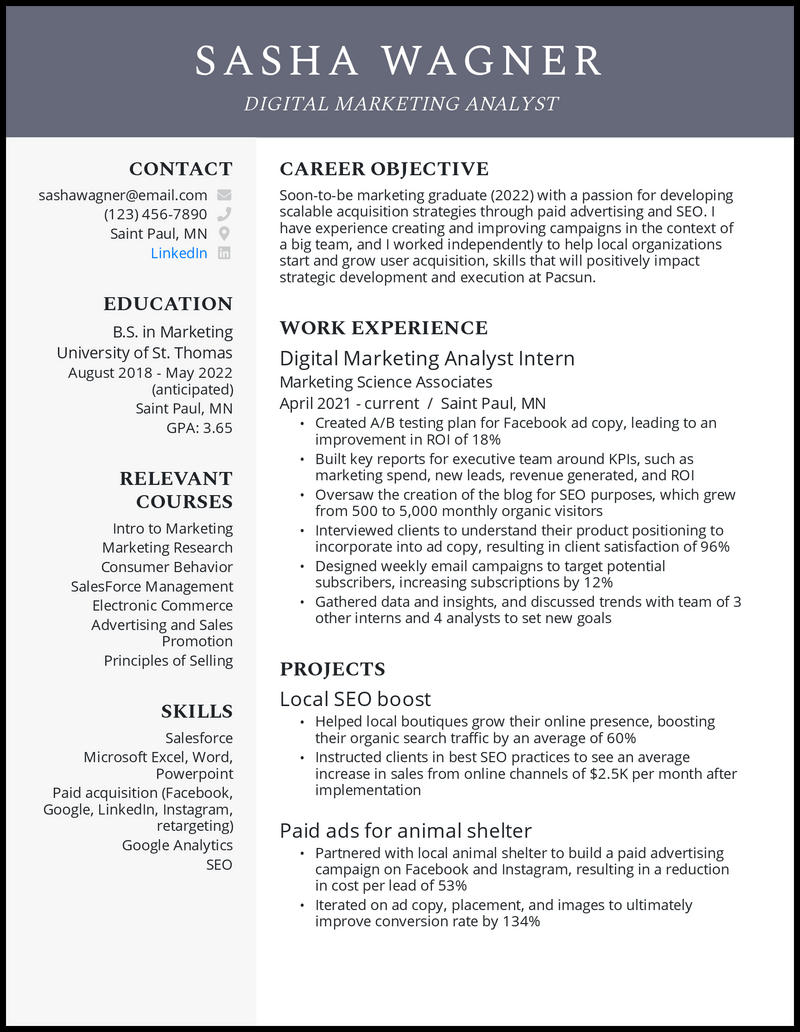
Why this resume works
- This lets employers know when you can work full-time. Whatever you do, be honest. Stretching the truth won’t get you any points with employers. It’s better to be upfront and willing to learn a skill rather than try to succeed by the skin of your teeth.
- The golden rule on your college student resume is to lead with your strengths. If you’ve got a relevant internship, add it. If you’ve done any related class projects, list them. No matter what you include, make sure to highlight transferable skills.
Undergraduate Student Resume

- To impress the recruiter, demonstrate the dedication you have had in your previous posts despite minimal experience.
University Student Resume

- In that case, your university student resume can capitalize on your analytical skills, which helped identify cost-saving opportunities and cut overall expenses by six percent.
College Student No Experience Resume

- Luckily, there are a host of resume templates you can use to format your experience well, so long as you adjust based on your qualifications.
- For example, you can add or remove sections based on the amount of work history you have (or don’t have).
- For example, being on the club basketball team may feel irrelevant to business analysis. But by focusing on how you’ve organized practices and led a local volunteer effort, your college student no experience resume can point to qualities that might appeal to a thoughtful employer.
Current College Student Resume
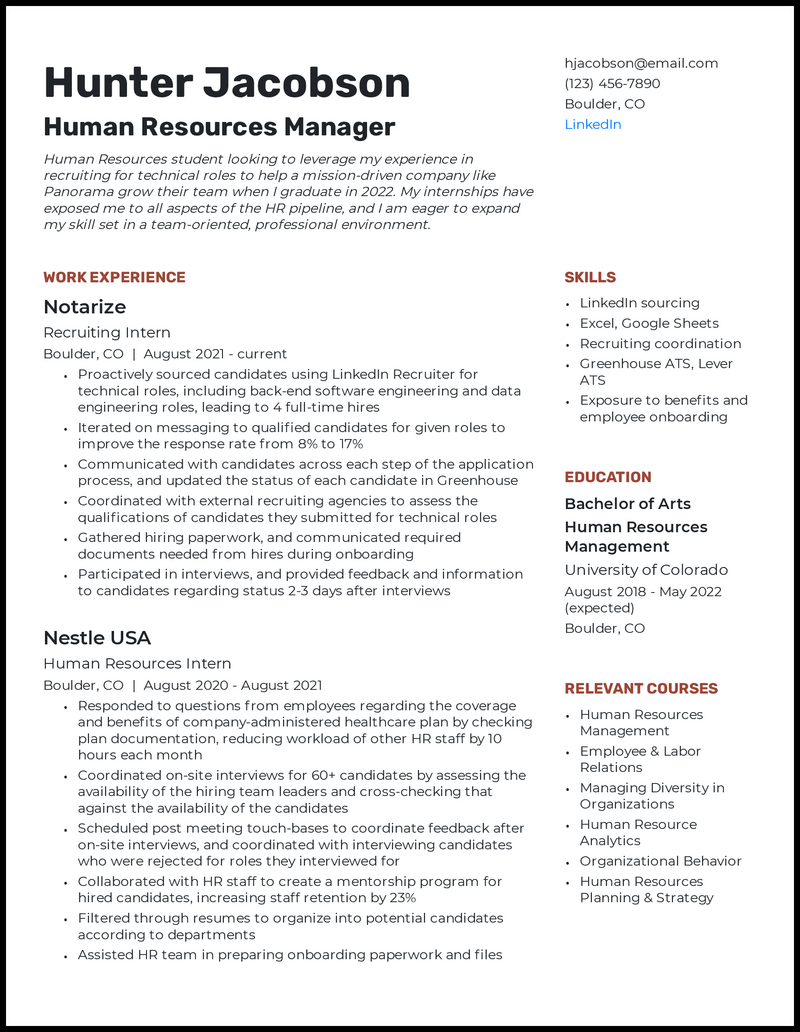
- A reverse-chronological format is still the most accepted, but if you want to highlight your skills, try using a functional format instead.
- Adding relevant metrics shows that you know what matters to your employer and you’ve positively impacted your previous workplace.
College Student for Internship Resume
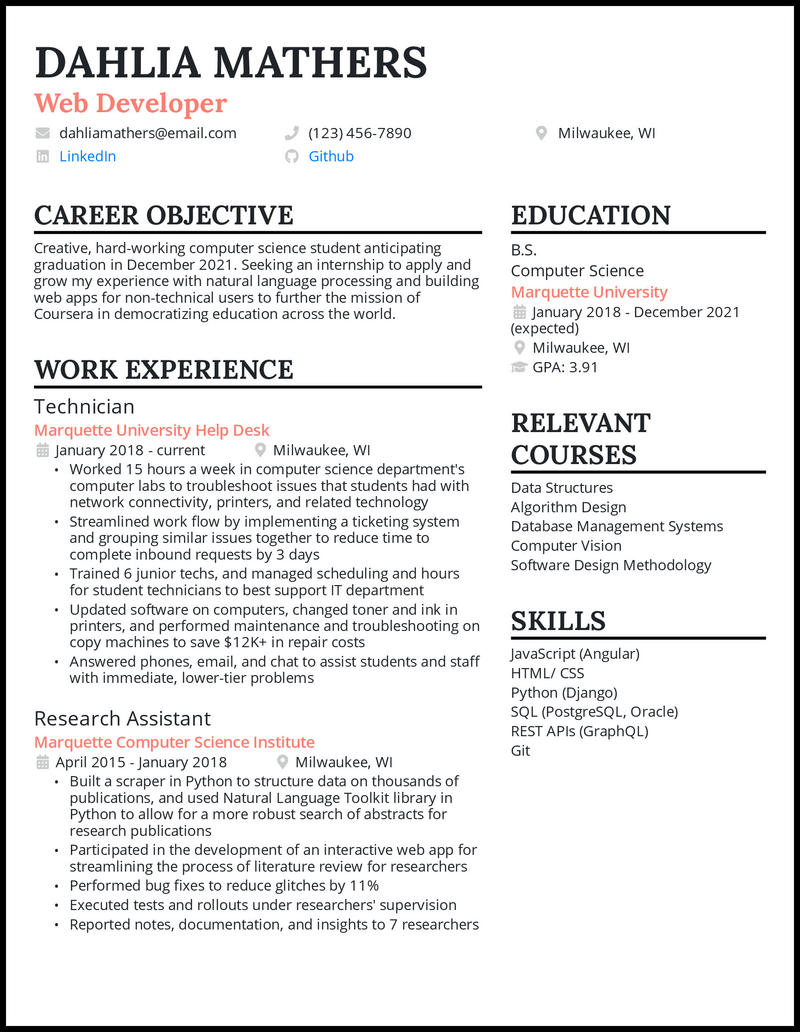
- That’s okay—you can weave in other things, like projects and part-time jobs. Of course, if you do have internship or job experience, put that at the top.
- It’s as easy as checking the job description . Then just list your relevant abilities according to what matches the keywords listed by the employer.
College Student Assistant Medical Laboratory Technician Resume Example
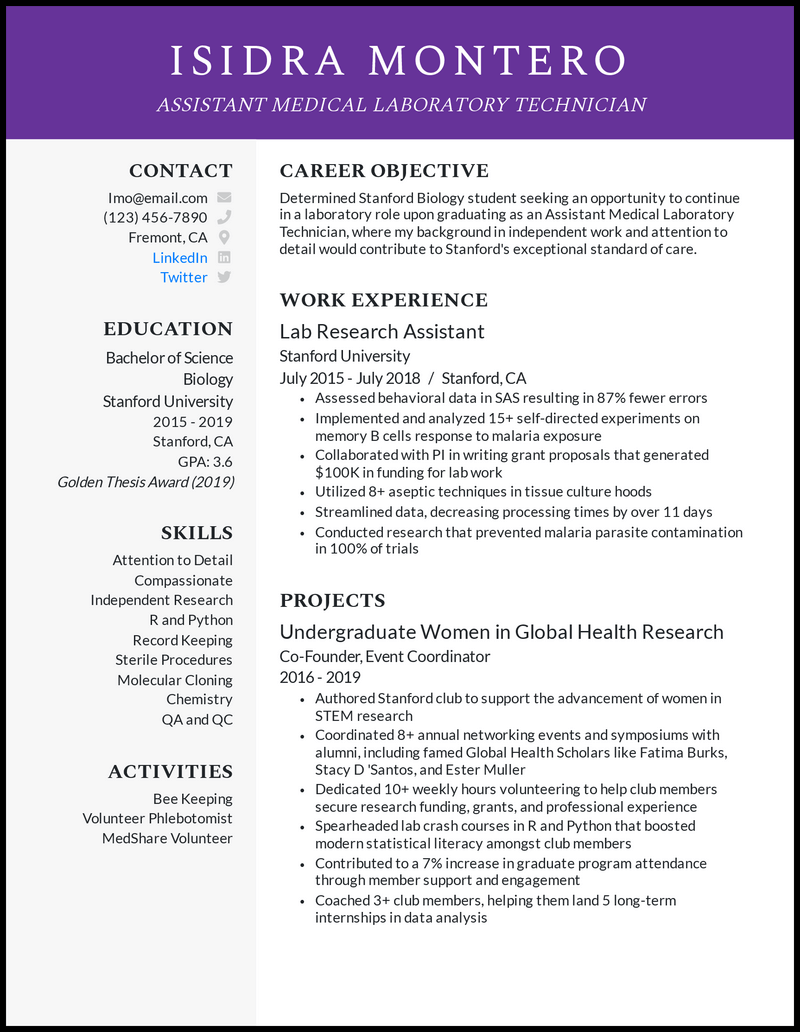
- Do you have a unique interest related to science? Are you involved in a sport? Do you volunteer? All of these hobbies are great additions to your resume.
- If you’ve just graduated, you can bulk up your education section.
- Feel free to add any college awards you won and your GPA (if it’s higher than 3.5).
College Student HR Executive Assistant Resume
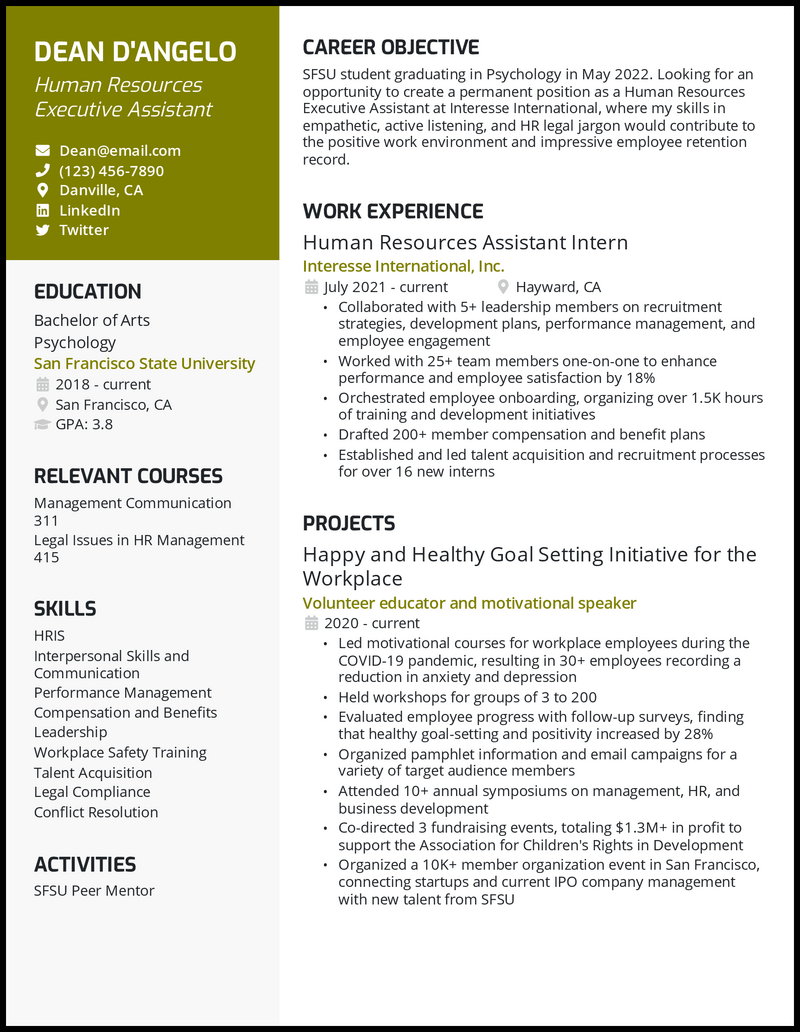
- As a rule of thumb, we recommend including one if you’re light on experience or are going through a substantial career change. Otherwise, leave it out in favor of work experience.
- Good skills to include on an HR executive assistant resume are “talent acquisition,” “conflict resolution,” “legal compliance,” and “compensation/benefits.”
- An even more effective way to breathe life into your skills is to weave them into your work history or project bullet points.
College Student Case Assistant Resume
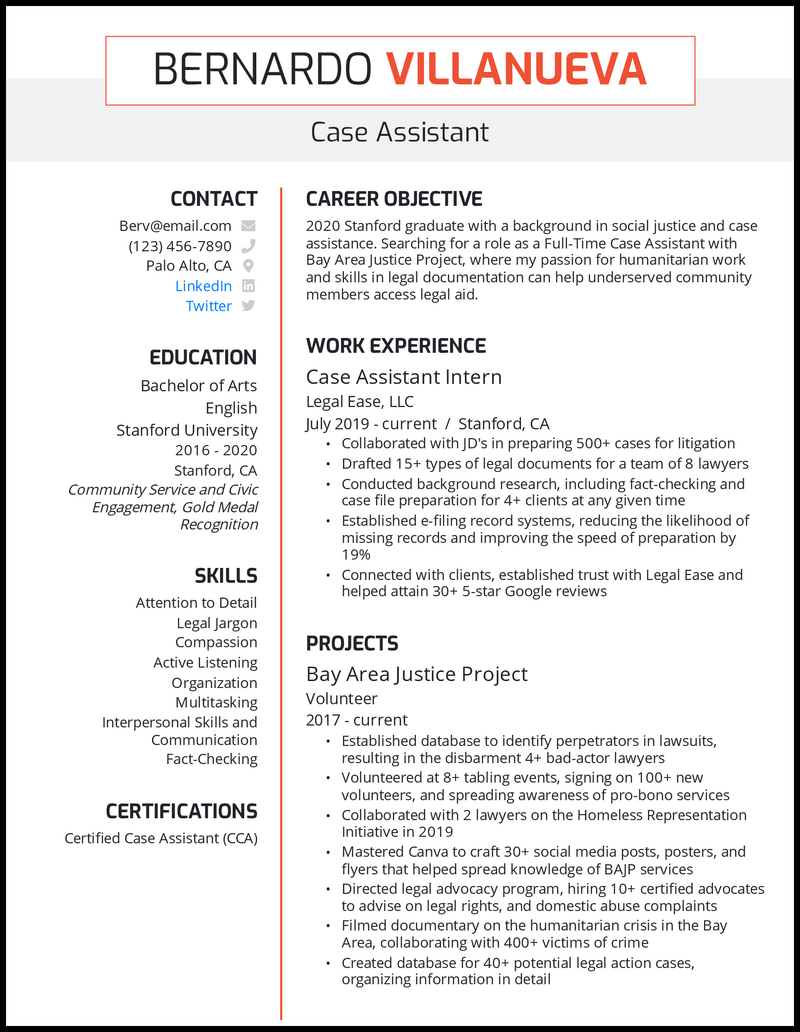
- Show off your personality using contrasting colors, classic fonts, and well-organized layouts. Our ready-to-build resume templates or handy Google Docs interactive resumes can help you keep your resume both tasteful and personable.
- If you don’t have certification, then now’s the best time to get it. Better late than never!
College Student Resident Assistant Resume
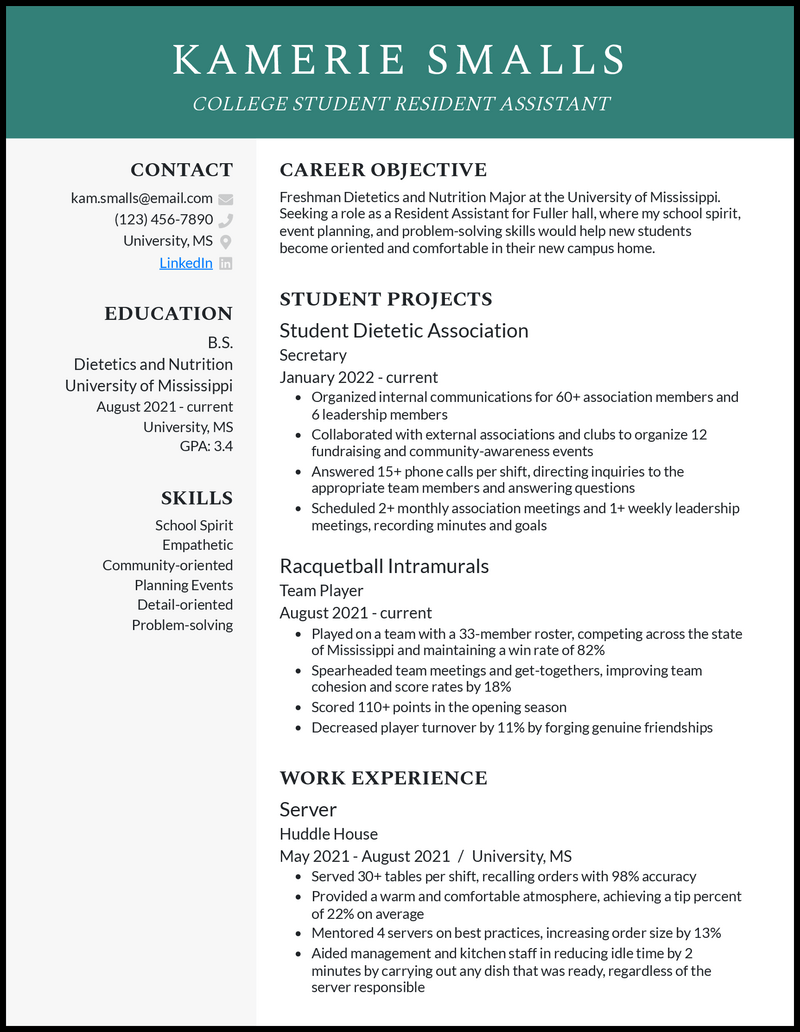
- Though an objective isn’t required, it can help employers see your skills and experience straight away.
- Just make sure to tailor it for every job you apply for by including the name of the employer, the position you’re seeking, and some matching keyword skills (that are true about you) gleaned from the job description .
- You also shouldn’t feel limited by your work experience. If you’ve done any relevant projects or have volunteered, include them! Employers love to see transferrable skills like collaboration, a good work ethic, and organization.
College Student Warehouse Worker Resume

- If you’re struggling to get going, consider using a resume outline to help you structure your experience—just don’t forget to fill out all the sections thoroughly!
- While it’s not impossible to land an excellent job without internships or experience, having some kind of work history, even in the form of projects, will allow you to be more picky and skim from the top of warehouse positions.
College Student Teacher Assistant Resume
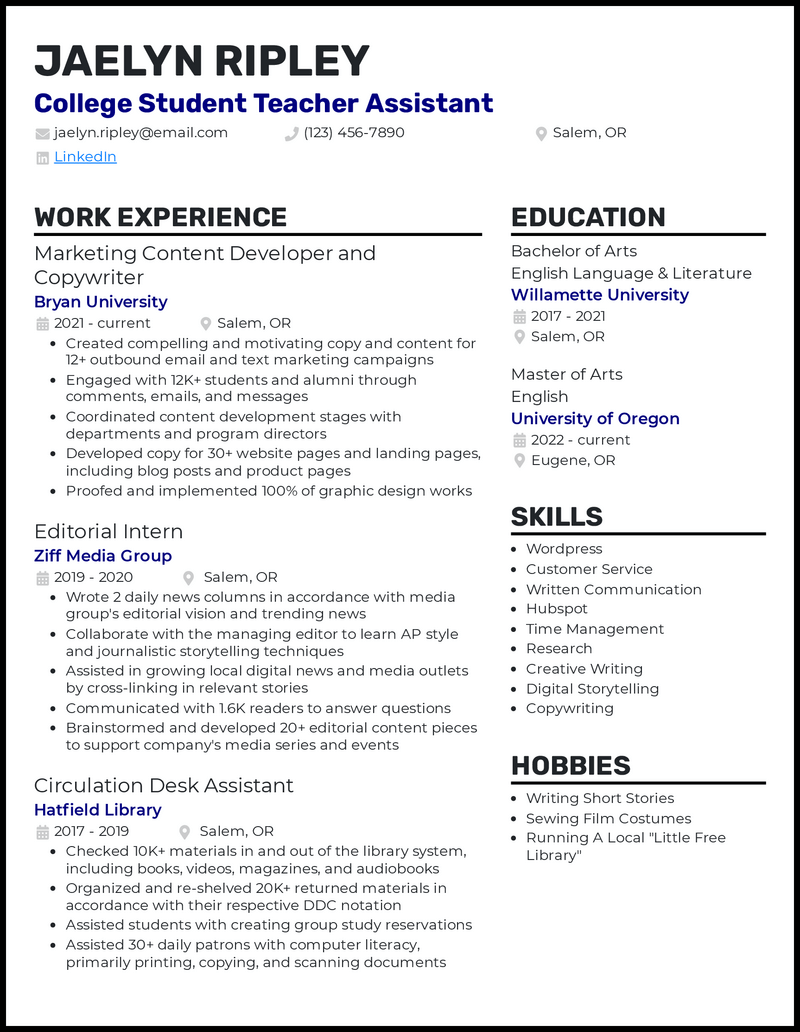
- Adjusting formatting details, like the layout and header colors, can make your resume pop and reveal a bit about yourself. (Red and pink are bold, daring colors, while blue and green are calming.)
- Adding a hobbies and interests section to your resume can also help catch the eye of employers, provided you list hobbies that are relevant to the desired job, such as creative pursuits, volunteering, or research.
- Even if you’ve never had experience as a teacher assistant, you can instill confidence by demonstrating the impact of your communication skills. Did you effectively resolve an issue using negotiation? Write something that added helpful clarity? Show how you used communication to affect others positively!
College Student Biology Lab Technician Resume
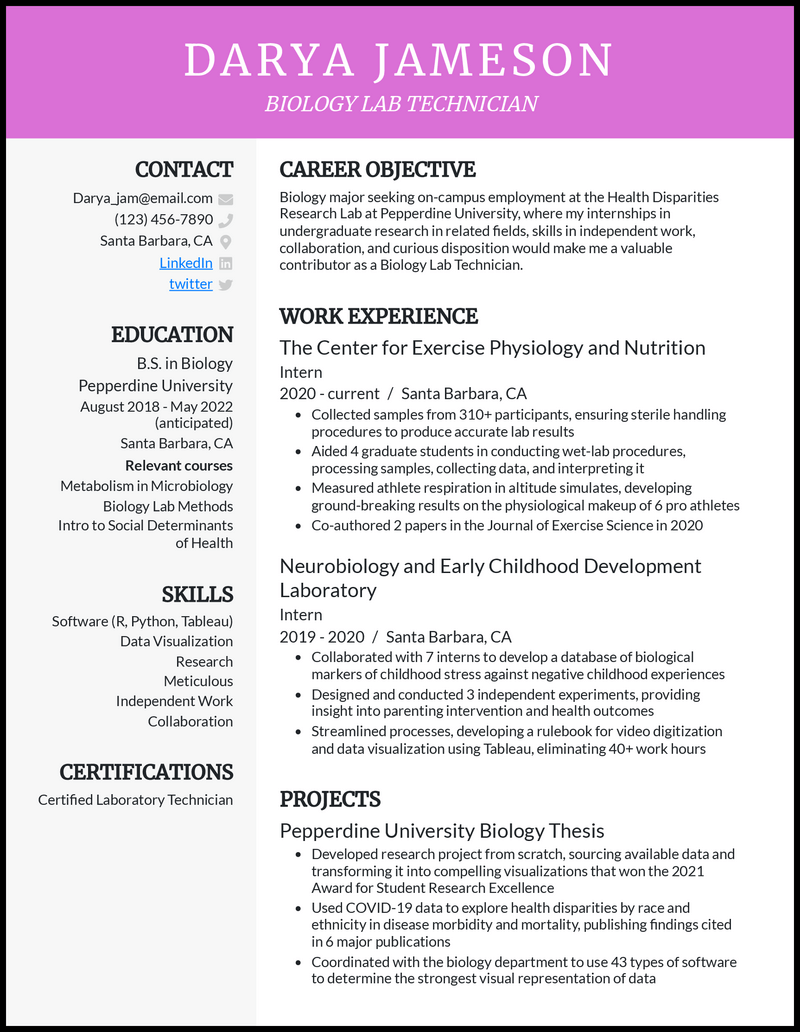
- Don’t get too carried away here; after all, it’s still a resume and not a flier for a Wednesday Night Disco. But, one to two colors can be appropriate for all but the most conservative working environments.
- Numbers can be frustrating to calculate and add to your resume, but trust us when we tell you that they make a world of difference. Hiring managers are consistently more willing to interview people with metrics on their resumes, as they convey job competence and confidence.
College Student English Tutor Resume
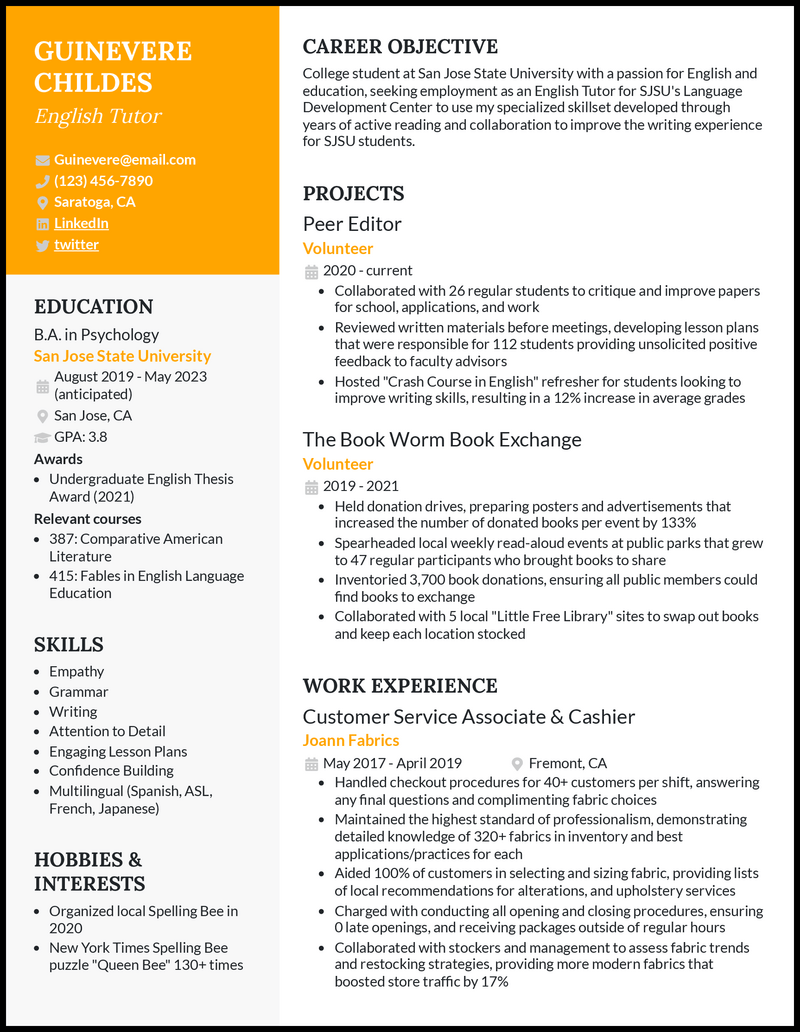
- Breaking up each work experience into bullet points can make your resume both easier to read (with fewer blocks of dense text) and easier to write.
- Instead of writing one big chunk of cohesive text, you can focus on pulling out as many highlights about your work history at each job as possible.
- A project can be anything. Seriously, your final group project from that writing seminar counts, or you could highlight a blog you’ve been working on in your free time.
- Hint: Projects also make great stories to discuss on your college student cover letter .
College Application Resume

- Suppose you’re applying for a Bachelor of Arts in education. Express your passion for teaching and eagerness to advance your knowledge of education theories and practices. Even better, emphasize your long-term ambition to shape future generations through innovative education methods.
College Admission Resume

- Take a leaf from how Brian narrates his stints as a restaurant server, project presenter, and volunteer. Well-described, such experiences paint a picture of a well-rounded character who can take on varied challenges of an engineering program, enhancing their appeal in the eyes of the college admissions committee.
College Freshman Resume

- Use past projects to advantage here even if they’re only a year long. Clearly state how you used skills such as Canva and Microsoft Teams to make specific impacts during this time. Another great addition to your college freshman resume is any work experience under your belt.
College Student Academic Highlights Resume
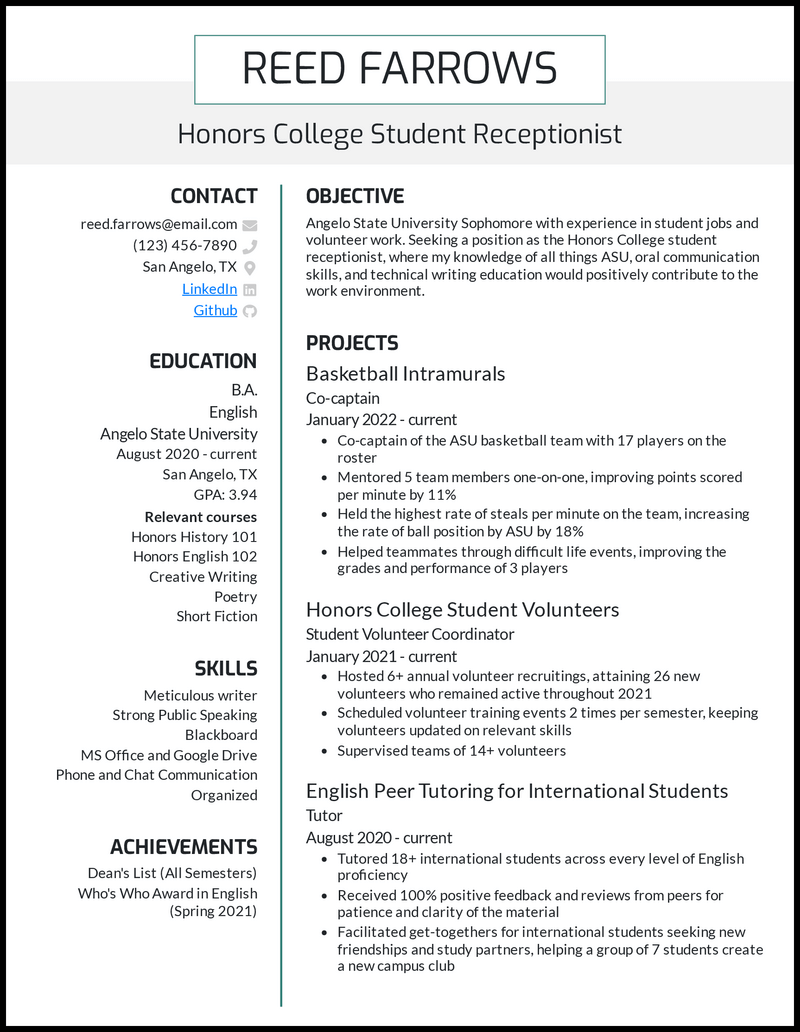
- Say you have some work experience, but it’s not relevant to the job. That’s okay—instead of trying in vain to match the job description , focus on transferable skills like customer service, organization, event planning, public speaking, and computer literacy.
- If you lack much work history, adding projects, coursework, or volunteer experience is the next best way to showcase your potential. You can also list your involvement in clubs, organizations, or peer mentorship.
- Write them like you’d write work experience by using active verbs and incorporating metrics (numbers).
First Year College Student Resume

- Your time contributing to a project is tangible evidence of your skills and experiences. Depending on what you include, it could showcase your communication and organizational skills or more technical abilities, like your proficiency with Microsoft Office.
Freshman College Student Resume

- Do you love gardening or nature photography? Awesome, it shows you’re inherently passionate about biology. Do you spend your time baking as well? It’s a sign that you know how to follow instructions and observe changes over time—skills that will come in handy as a lab assistant.
Related resume guides
- College Graduate
- Grad School
- Entry level

Before we dive into the difference between a resume objective vs. a resume summary , let’s get some definitions out of the way:
- Resume objective : A statement of your qualifications, interests, and skills that make you a good fit for the role to which you’re applying.
- Resume summary : A summary of your past experience detailing your high-level accomplishments and projects.
When you’re applying for a job or internship as a college student, you likely won’t have extensive work experience. So, we’d recommend including a resume objective instead of a resume summary.
The goal of your resume objective is to set the stage for your resume. It should highlight your skills applicable to the job at hand, and it should be specific for each job to which you’re applying.
Most resume objectives are boring and generic. By taking the time to craft a customized and effective resume objective, you give yourself an edge over other applicants and increase your chances of getting an interview.
Before we dive into the rules for creating a strong resume objective, let’s look at some examples.
Sample college student resume objectives
- “Recent college graduate with a degree in marketing looking for a full-time role where I can utilize my experience in social media and paid advertising to help an up-and-coming brand like Club Z! Inc. spread awareness and acquire more users.”
- “Diligent college student at the University of Pittsburgh who is equally committed to academic excellence (3.8 GPA) and service (student leader at the local food shelter) looking for an opportunity at Unidos as a part-time employee to utilize these talents to improve customer satisfaction.”
- “Recent graduate with a Masters of Business Administration (MBA) seeking an opportunity within an established management organization to utilize my organizational and quantitative abilities. Epic seems to have a culture of empowering employees to have ownership over their problems, and that culture fits my work style perfectly.”
You can see that all of these resume objectives specifically mention the company that the student is applying to. Tailoring is the golden rule of resume objectives.
Here are some other rules to make your objective the best it can be:
- Again, take the time to customize your resume objective for each company to which you’re applying .
- Don’t be afraid to inject your personality. Making an impression will help you stand out among the hundreds of other applicants.
- Keep it to two to three sentences.
- Mention any relevant skills or certifications you have for the role to which you’re applying.
College Student Resume Formats

One of the hardest parts of building your resume as a college student is the blank page. The “getting started” part is overwhelming—you’re unsure what your resume should look like, let alone what should be in it!
When it comes to formatting your resume, the best advice is to keep it simple . You need to convincingly make the case that you deserve an interview for the role to which you’re applying.
In short, your resume should likely contain the following sections:
- Header: This is your name and job title. Have your job title match the job title to which you’re applying.
- Resume objective: We talked about this above, a quick summary of your skills and what you’re seeking.
- Education: As a college student, this should include your anticipated graduation date, the field of study, and relevant classes.
- Skills: List six to ten technical skills relevant to your career.
- Work experience: If you have any relevant internships or part-time jobs, mention them here.
- Projects: Did you do any side projects that demonstrate your competency? Include them!
Not all of these sections need to be included in your resume. Your resume should focus on your strengths.
If you don’t have much relevant work experience, you can omit that section in favor of discussing your projects or classwork.
However, no matter what format you choose, there are a few writing guidelines you should adhere to throughout your resume.
Formatting guidelines for your resume
- Keep your resume to one page! Your resume should only extend to a second page when you have 10+ years of experience.
- Avoid any spelling or grammar errors by double-checking your text and having a friend review your resume. Don’t let typos be the reason why you don’t get an interview.
- Break up your work experience into small, consumable bullet points. Nothing is harder to read than a big wall of text.
- Use reverse-chronological order to keep your most recent experience/projects at the top.
- Don’t include fancy images or graphics. It’s highly likely a computer will read your resume before a human ever does, and images are hard for computers to scan.
- Don’t list more than ten skills on your resume. (We’ll expand on this below.)
Skills to pay the bills
When building your skills section, it can be tempting to list any and every skill you know. You’ll have to resist this temptation.
Before a human reviews your resume, an automated system called an Applicant Tracking System (ATS) will score your resume based on whether or not it includes the “right” keywords. These filters are largely screening for specific skills.
Doesn’t this mean that you should include as many skills as possible to beat the ATS? Unfortunately, you need to make your resume appealing to both the ATS and a human, and nothing is a bigger red flag to a hiring manager than a candidate with a laundry list of skills!
You’re much better off focusing on six to ten skills you’re an expert in than including more that you kind of know. Generally, if you wouldn’t be comfortable being interviewed on a given skill, don’t include it on your resume.
Work Experience and Projects

In any resume, no matter the career stage, your work experience and projects should take up at least 70 percent of the overall space. These will decide whether you get an interview or not.
Once you have a few years of experience, then the size of your projects section will decrease as the size of your work experience section expands.
If you have an internship relevant to the job you’re applying for, this should be listed in your “work experience” section. As a college student, your work experience can also contain any part-time jobs you had while in school, even if they don’t seem relevant to the position to which you’re applying.
It’s not easy to balance work and school, so having a part-time job demonstrates responsibility and drive.
When talking about your work experience, there are a few key tips you should follow:
- Mention the skills you demonstrated on the job.
- Quantify the impact of your work whenever possible.
- Talk specifically about your role; avoid being too general.
- Use action verbs like “owned” or “led” to highlight your leadership abilities.
Numbers truly speak louder than words, especially on your resume. By providing numerical context around your work, you show your ability to contribute meaningfully to your workplace.
Compare these two descriptions of an internship. Which do you think would be more compelling to a hiring manager?
WRONG – general work experience descriptions
Marketing Science Associates April 2020 – Current, New York NY Digital Marketing Intern
- Created testing plan for Facebook ad copy
- Built key reports for the executive team around KPIs
- Oversaw the creation of the blog for SEO purposes
- Worked closely with clients to understand their product positioning to incorporate into ad copy
RIGHT – specific, quantified descriptions
- Created A/B testing plan for Facebook ad copy, improving ROI by 15%
- Built key reports for the executive team around KPIs such as marketing spend, new leads, revenue generated, and ROI
- Oversaw the creation of the blog for SEO purposes which grew from 1,000 to 5,000 monthly organic visitors
- Worked closely with clients to understand their product positioning to incorporate into ad copy, leading to client satisfaction of 99%
Projects can be anything
If you don’t have much (or any) relevant work experience for your resume, don’t fret. You can still create a highly effective resume by showcasing your projects.
As a college student, you’ve likely done a lot of class projects that are relevant to the job or internship you’re looking to get. This is the perfect place to talk about those projects. You can even mention projects you completed outside of class. Talk about your goals, the methods/skills you used, and the project’s outcome.
The key is to include anything that will convince the hiring manager you have the drive, skills, and ability to translate your academic knowledge to the real world and contribute to the roles for which you’re applying.
Here are some potential projects you can work on for different majors:
Project ideas for college students
- Are you a business student? Detail a case study that you analyzed and presented in a class.
- If you’re a marketing student, you can write a short blog post about how you’d improve the paid marketing strategy for a company you admire.
- As a graphic designer, this is a great opportunity to talk about some of the projects in your portfolio.
- If you’re looking for a data analyst role, talk about how you analyzed stock data to determine areas of opportunity.
- As a human resources major, you’ve likely created processes for companies as part of a class, so talk about that.
- Software engineering students complete meaningful coding assignments all the time. Discuss one of those or talk about your side project.
- If you’re looking to break into product management, discuss a hackathon you were part of or create a case study for a feature your favorite product is missing.
Basically, the projects you include on your resume can be just about anything. They simply have to demonstrate you know what is required of the kind of role you’re applying to, and that you can meet those requirements.
Your Education Section

As a college student, it should go without saying that you need to include an education section on your resume.
Here’s what you need to include in your education section no matter what:
- The school you’re currently attending (or recently graduated from). You do not need to include your high school.
- Your graduation date (or expected graduation date). You can give just the month and year.
- The kind of degree you’re working toward (bachelor of arts, bachelor of science, master’s, etc.).
- Your field of study.
Once you include all that, there’s more flexibility. If you have a strong GPA (greater than 3.5), you should include it, too.
If you don’t have much experience yet, then you can add relevant courses or awards to your education section, provided they’re relevant to the job for which you’re applying.
For example, if you’re applying for a role as a data scientist, then it makes sense to include any math, economics, or programming classes you completed.
Here’s an example of an effective education section for a college student looking for a marketing role:

If you received any awards or honors during your time in college, list them here. These can include getting on the Dean’s List, any department-specific awards relevant to your major, or formal recognition for your work or volunteer efforts.
Resume Builder for College Students

There you have it—we’ve discussed the building blocks to help you land a job or internship as a college student!
In summary, here are the keys to making an effective resume as a college student:
- Inject your personality into your resume objective and customize it for each company to which you apply.
- Your resume format should include a header, resume objective, skills section, education, and work/ project experience.
- Include any relevant internships or part-time jobs you’ve had during college and quantify the impact of your work.
- If you don’t have much working experience, include relevant projects you’ve completed either in the classroom or on your own time.
- Your education section is your chance to highlight classes you’ve completed that will convince the hiring manager you have the right tools for the job.
Finding a job or internship as a college student can be incredibly stressful. Building your resume is a huge first step, so pat yourself on the back. After you’re done with the writing, you can check your resume against our AI-powered tips to see how your resume matches up.
Just remember, it does get easier after you get some experience first. We can’t wait to see where you’ll go!

• We’ll show you how, step-by-step • Real, practical tips and tools • 100% free

How to List a Major & Minor on Your Resume (with Examples)
In This Guide:
Should you include a minor on your resume, when is it okay to stop putting major/minor on my resume, how to list degrees and minors on resume, consider adding extra information, key takeaways: listing major & minor on resume.

You just graduated and you are starting to search for your first job.
At first, it sounds scary, we know.
You had a Major and probably also a Minor in your college. You had all this theory in a specific field, and if you were lucky, you also had some practice.
You are not sure how they are going to help you get that first job and gain some experience and you are probably wondering whether it’s a good idea to include your degrees at all.
It’s okay, we got you covered.
Here are a couple of tips on how to use major and minor degrees in your resume to your advantage (with some examples).
And if you want to gain more knowledge on how to make a perfect resume, you can look through our Resume Examples and then use that tips and tricks in our Resume Builder .
Are you ready?
Obtaining knowledge in a secondary discipline (a minor) makes you more attractive for the Recruiters. Your knowledge has become more diverse or more specified and this could make you a perfect job candidate.
So this means that minors could open many additional doors.
The best thing to do is to determine if your minor is relevant enough to be included.
Generally, you want to try keeping your resume as clean and simple as possible and it’s better to write information that adds value.
If your minor is relevant, include it for sure. It will catch the Recruiter’s eye and could ensure you get that interview.
That will vary depending on what you’re applying for, how related it is to the position, and how impressive your Major/Minor degree is. There is a time when your degree stops adding value to your application.
You should however determine the specific timing for taking it off your application for yourself
If you don’t know when, answer these questions, and it will be easier for you to figure it out:
- Does the point show success or highlight a skill?
- Are those skills or attributes valued?
- Are those skills or attributes already communicated someplace else?
- Do you have experience in the sector?
List Your Major First
- Major on a Resume—Examples
Massachusetts Institute of Technology, Cambridge, MA
Bachelor Degree in Electrical Engineering
Graduation year: June 2019
- Examples for listing a double major on a resume – list your primary major first and then your secondary major in the same line
Columbia University – New York City, New York
Bachelor’s Degree in Psychology: Major in Health Sciences, Major in Nutrition
Graduation year: June 2020
GPA 3.5 / 3.9,

Follow Your Major With a Minor – Examples
University of California, Berkeley — California, MD
Bachelor of Arts: Major in Sociology, Minor in Psychology
Graduation year: June 2016
Loyola University Maryland — Baltimore, MD
Bachelor of Arts: Major in Psychology, Minor in History
GPA 3.6 / 3.8, Dean’s List for 7 semesters
If you don’t have a lot of experience, you should try including relevant information for the position, such as your GPA, coursework , or extracurricular activities.
However, when it comes to including GPA, do it only if your grade is more than 3, if it’s less, better leave it off.
When writing extracurricular activities you’re involved in, describe what you did, rather than what it was. For example, I planted 400 trees as part of the environmental club.
Include more information about your activities when you have the chance.
Simply listing that you’re a member of many clubs/organizations doesn’t mean much.
Another good way to demonstrate your expertise is by including your relevant coursework if you are still freshly graduated.
If you’re applying for a job that emphasizes the importance of academic experience, like an internship or other education-focused position, it would be best to include a relevant coursework section on your resume.
If you have enough space, you could include them in a bullet list. This way it would be easier for the Recruiter to read.
Another way to write it is a separate section if you want to include more than just the names of the classes. A perfect way to tell the Recruiter what you have learned through your studies when they are related to the job you are applying to.
See more information on how to perfect the Education section on your resume, here .
Now you know how to list a Major and a Minor in your resume.
Here are the key tips you could use to make your resume preferable, even when you have little to no experience:
- Include the education section to your resume and place it before the experience section to be easily seen.
- Include the name of the college and location, degrees earned (major and minor), and graduation date.
- Include information on your major. If you hold a double major make sure you list your primary major first.
- Add information on your minor just like you did for the major.
- You could add extra information to your education section to make it more powerful, such as GPA, relevant coursework and activities, awards, and etc.
*** What are your thoughts? Did you list your Major and Minor degree on your resume? Give us a shout-out in the comments below. We’d love to hear from you!

- Resume Guides
5 Tips to Create a Master Resume and Speed Up Tailored Resume Creation
Star resume template, what makes a strong resume, how to show you are "self employed" on your resume, can a cover letter be two pages, resume for 10 years of experience.
- Create Resume
- Terms of Service
- Privacy Policy
- Cookie Preferences
- Resume Examples
- Resume Templates
- AI Resume Builder
- Resume Summary Generator
- Resume Formats
- Resume Checker
- Resume Skills
- How to Write a Resume
- Modern Resume Templates
- Simple Resume Templates
- Cover Letter Builder
- Cover Letter Examples
- Cover Letter Templates
- Cover Letter Formats
- How to Write a Cover Letter
- Cover Letter Guides
- Job Interview Guides
- Job Interview Questions
- Career Resources
- Meet our customers
- Career resources
- English (UK)
- French (FR)
- German (DE)
- Spanish (ES)
- Swedish (SE)
© 2024 . All rights reserved.
Made with love by people who care.
College Application Resume for 2024 [With Examples, Tips & Template]

They say college is the most exciting time in a student’s life and we couldn’t agree more!
The only thing standing between you and your dream university, though, is a college application resume.
You open the resume document, get ready to start writing…
And nothing comes out! After all, how can you even make a resume when you haven’t worked a day in your life?
Worry not - you don’t need any work experience to write a compelling college application resume. In this article, we’re going to teach you just how you can do that!
What Should a Resume for College Application Contain?
- 5+ College Application Resume Formatting Tips
- How to Write a Resume for College Applications?
- 3+ College Application Resume Tips
College Application Resume Template
So let’s dive in!
Before we get into the knits and grits of writing a resume for college application, let’s first do a quick review of what your resume should contain:
- Contact information , including your full name, address, phone number, and professional email.
- A resume objective , where you state the goal of your college application resume.
- Education section , where you list the history of your grades and exam scores.
- Relevant activities , including any work experience you might have.
- Skills relevant to a resume for a college application, e.g. soft skills such as active listening, interpersonal skills, communication skills, or hard skills such as public speaking, MS Office, or computer skills.
- Additional sections , such as awards and honors.
6 College Application Resume Formatting Tips
Before we dive into the nits and grits of CV making, let’s talk about formatting. Here are our top tips on how to format your college application resume:
- Choose the functional/skills-based resume format. This format is perfect for those who lack work experience , as it focuses more on your skill-set. If you DO have some work experience, though, then you can opt for the chronological format.
- Keep your college application resume one page long . As a rule of thumb, this is the optimal length for a resume—professionals with 10 years worth of work experience stick to the 1-page limit, so there’s no excuse for someone with little to no work experience to go overboard.
- Add plenty of white space , especially around your resume’s margins. It will make your resume look less cluttered and more reader-friendly.
- Include clear section headings and use the same heading for each section.
- Use an easy-to-read font. Some resume fonts (such as Ubuntu or Overpass) are resume friendly—professional-looking, easy-to-read, and yet modern. Others, like Comic Sans, are just one big NO.
- Save your college resume as a PDF. You might be used to Microsoft Word, or even think it’s the safest alternative, but MS Word has a good choice of messing up your resume format if opened in different computers or operating systems. PDF files, on the other hand, remain the same no matter what computer opens them.
How to Write a Resume for College Applications? (With Examples)
Once you’ve got the formatting done right, it’s time to get to writing your college application resume.
In this section, we’ll walk you through that process, starting with:
#1. Order Your Contact Information the Right Way
As we already mentioned, your college application resume should start with your contact information.
These are your contact information section must-haves :
- Full name and address
- Functional phone number where you can be reached.
- Professional email address, preferably consisting of your first and last name.
And here’s what this looks like in practice:
Sharon White
123 Main Street
New York, NY
Phone Number: 553-123-1234
Email: [email protected]
#2. Write an Attention-Grabbing College Resume Objective
A resume objective is a 2-3 sentence long paragraph that should communicate your motivation for getting into college or for studying a specific major.
As such, a well-crafted resume objective can instantly attract admission officers to read the rest of your college application resume.
There is, however, a right and wrong way to write a resume objective.
A convincing resume objective is:
- Tailored to the university/major you’re applying to, instead of looking like a one-fits-all kind of statement that you can use to apply to several colleges.
- Highlights the achievements that give you an edge over the competition.
The following example does that right:
Aspiring journalist with a knack for creative writing looking to deepen their knowledge through NYU’s renowned Journalism track. Founder of my high school’s first online newspaper, the ‘Daily Prophet,’ which now has over 2,000 subscribers. Hardworking, with a grade A average in social sciences and commitment to improving.
Now compare it to the following resume objective, which although articulated looks like a one-fits-all kind of statement that you can just insert into several college applications.
Very committed high-schooler with a calling for social sciences. With an SAT score of 1400, a passion for psychology, and experience as a peer counselor, I am confident that my hard work and motivation will shine through as a college student.
See, the resume objective is your chance to show exactly why you want to attend that college, right from the start.
So, even if you don’t have many achievements to highlight, make sure to personalize your statement by expressing a genuine interest in your application.
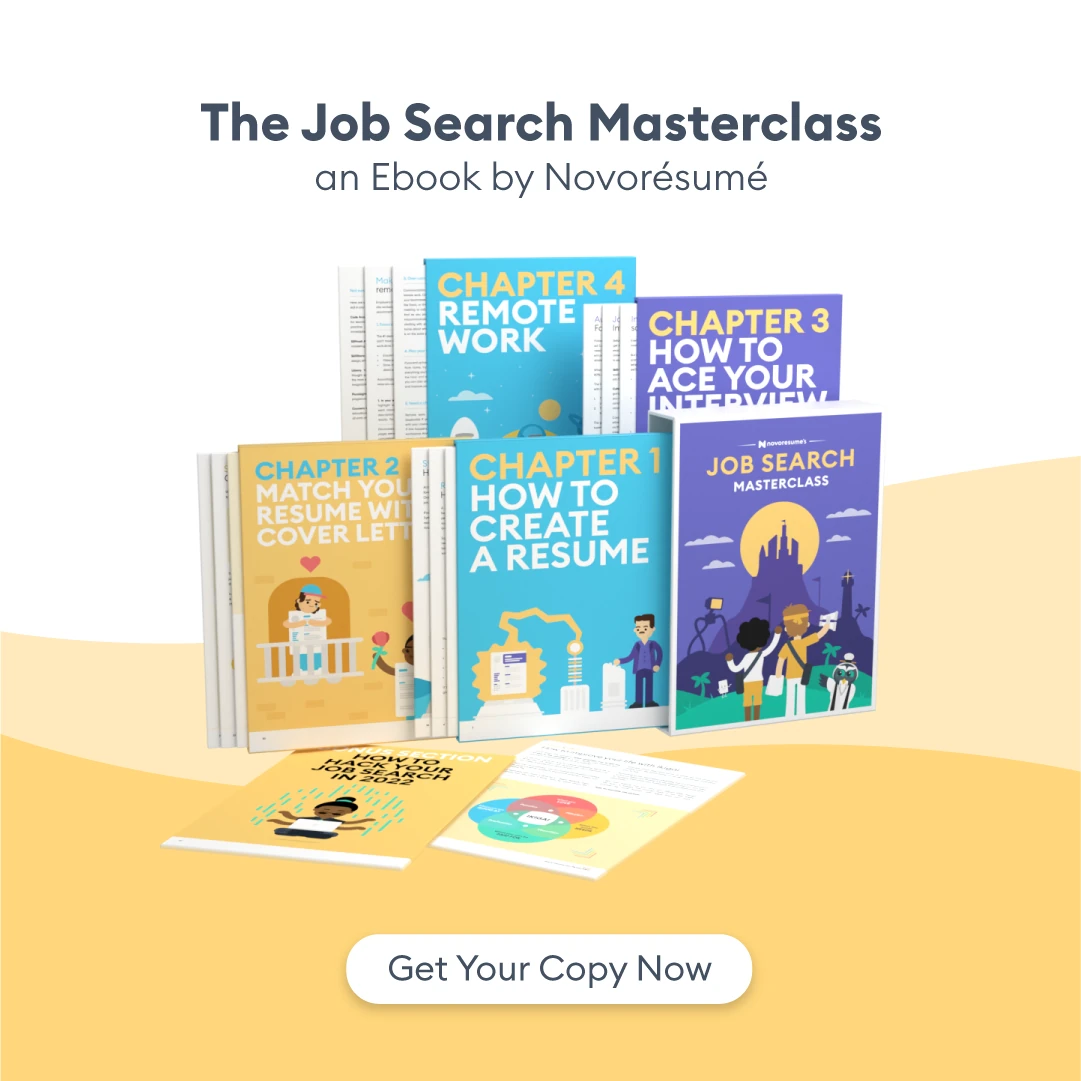
#3. Put Weight on Your Education
Taking into consideration that, as a student, you most likely lack significant work experience, your education is the first thing admission officers will look at.
As such, you should give your education its due importance in your college application resume.
For starters, make sure to include this must-have information:
- Your high school’s name and location
- The date of your graduation
In addition, though, combine that with some relevant achievements that can make your education pop out.
Let’s take a look at two examples. The second student has simply listed out the essential education information, whereas the first has taken their education section to the next level.
Dunnellon High School FL
2017 - 2021
- 3rd place at the International Mathematical Olympiad
- Vice-President of the Science Club
- SAT Scores: 1350 (650 Verbal, 700 Math)
- SAT Scores: 1400
#4. Showcase Relevant Activities
Extracurricular activities have a great number of benefits when it comes to your college application resume. Most importantly, they:
- Demonstrate you who are outside of the classroom
- Provide an opportunity to showcase your skills
Any activity and/or interest related to the college you’re applying to has a place on your college application resume, but you don’t have to necessarily stop there.
Any kind of interest, field, or activity where you’re good at can be of benefit to your application.
That’s because it can prove that your interests are not focused solely on your favorite subject or desired career path and that you are engaged and well-rounded .
So, don’t just list your college resume activities dryly (e.g. “reading” or “swimming”). Instead, be specific and creative about your interests, and rest assured that you will get extra points for diversity and commitment.
Don’t believe us? Compare for yourself how the activities sections of two different students look like: the first has put minimal effort into it, whereas the second has put his A-game into writing it.
- Passionate about science
- Co-founder of the Astrophysics Club
Activities
- Two-times winner of my high school’s Science Fair
- Co-founder of the Astrophysics Club, finalists of the MIT-founded THINK challenge
- Swimmer from an early age and member of my high school’s swim team during junior and senior year
- Traveling; I have so far visited 10 countries and 15 states in the USA.
- Photography, with a focus on architectural photography.
#5. Highlight Your Work Experience
Now, if you’ve spent your summer holidays working any type of job for teens , that means that you also have some work experience under your belt.
Although work experience is not necessary when you’re applying for college (meaning that you won’t get left out of college if you don’t have any), it does help to include it if you have it.
Here’s how to list work experience in your college application resume:
- Start with the company name (e.g. if you worked at Starbucks), your job title, and the period you worked there.
- Put your job title first if you worked, say, as a high-school tutor or camp counselor.
- Include 1-2 of your main responsibilities in bullets. If you have achievements to show for, however, make sure to put them first.
Let’s see how that works in a practical example.
Starbucks Coffee
- Awarded employee of the month for 3 months straight
- Fielding customer complaints and questions
- Maintaining good customer service and speedy delivery
Even if the above position isn’t related to the student’s desired field of study, the work experience still highlights some of their skills such as commitment, time management, effective communication, and motivation.
#6. Include Your Skills
Skills—we all got them, but not everyone knows how to demonstrate them effectively in a college application resume.
There are two things to consider when you include skills in your college resume:
- Know the kind of skills that are relevant to your major/field.
- Prove your skills, instead of just listing them
Let’s show you how that works through practical examples:
- Time management
- Critical thinking
Are these great skills for a college applicant? Sure!
But anyone can claim to have those skills (and frankly, most people do).
Rather than just listing these skills, you want to also back them up with achievements and experiences like so:
- Attention to deadline: managed to update the high school’s online newspaper daily
- Leadership: successfully led a team of 6 reporters.
- Creativity: won the 2021 Young Writers competition
- Self-motivation: founded the high school’s first online newspaper
Now, this is a skills section on a college application resume that proves you deserve a spot in your favorite university.
College application resume skills
Wondering which skills to include in your college application resume? Here’s a list to draw some inspiration:
Soft Skills
- Good judgment
- Open-mindedness
- Communication
- Self-motivation
- Interpersonal skills
- Active listening
- Problem-solving
Hard Skills
- Computer Skills
- Programming
- Public Speaking
#7. Use These Additional Sections
If you’ve followed all our tips till now, congrats - you’re around 90% into creating a top-notch college application resume.
Now, let’s talk about how you can take that to 100%!
In addition to the conventional resume sections we’ve covered till now, you can include the following to help you stand out in a sea of other applicants:
- Awards. Here, you can list any awards won in competitions (spelling, art, storytelling, math, etc).
- Volunteer experience . Did you clean up your town, or maybe you volunteered at an animal rescue center as a high school student? Any kind of volunteering can help your college application resume because it shows you’re a responsible community member. If it’s somehow related to your field or future major, that’s a big plus.
- Projects. Be them individual (e.g. you built a website from scratch, or started an informational podcast), or school-related (e.g. an art portfolio for a class, or a history documentary), projects can show that you’re passionate and creative.
- Sports. Poet Juvenal said “ a healthy mind in a healthy body. ” This means that physical exercise is an important part of mental and psychological well-being (which is why sports in a college application resume make all applicants look good). Do you excel at specific sports? Include them in your resume!.
- Languages. Being fluent (or even just a beginner) in a foreign language is another plus for a prospective college student. Make sure to show it in your college application resume.
5 College Application Resume Tips
Finally, here are some of our college application tips that didn’t fit anywhere else in the article:
- Be direct and to the point. Your college application resume is not the right place to show how many SAT-level words you know. Keep your language simple, direct, and to the point. Let your achievements and results speak for themselves.
- Don't lie about your academic background or accomplishments. Lying about the awards you’ve won or your achievements won’t get you into college. More often than not, admission officers will see through your lies by asking behavioral interview questions .
- Proofread your college application resume. Spelling and grammar mistakes can make you appear like a less serious applicant. Imagine telling recruiters that you have great SAT scores and GPA but having spelling mistakes in your resume. Kind of contradictory, isn’t it? To avoid these kinds of mistakes, use spelling and grammar apps such as Grammarly and Heminway .
- Have one or more people look at your resume before you send it out. There are kinds of mistakes that Grammarly or Hemingway cannot catch. To avoid such mistakes, have one or more people that know you give your college application resume a look.
- Emphasize specific achievements over general responsibilities. As mentioned before, emphasizing your achievements over your responsibilities is the best way to set yourself apart from other candidates. The reason is that your achievements effectively show how well you handle responsibilities and they are uniquely yours.
Making a resume from scratch can take what feels like ages—especially if it’s your first time doing it.
You’ve got to tweak the formatting.
You make a change at MS Word and the layout falls apart in front of your eyes. Or you end up using a bland and outdated template.
Well, you don’t have to worry about any of these things with Nóvóresume’s free resume templates .
With 8 free templates to choose from - college application resume included - you don’t have to worry about anything other than inputting your information.
Let our resume builder do the rest!

Key Takeaways
And that’s a wrap on college application resumes. We hope to have made the process of writing yours easier and even more enjoyable.
For good measure, let’s go over the main points we covered:
- Your college application resume should contain the following sections: contact information , personal profile , education section , relevant activities , your skills , and additional sections , such as awards and honors.
- In terms of formatting, the functional resume template fits your college application best. Additionally, make sure to keep your resume one page long and save it as a PDF.
- Write a resume objective that doesn’t surpass 3 sentences and that clearly communicates your motivation for getting into college and your most relevant skills.
- Make sure to give your education section its due importance by being thorough about your grades, SAT scores, and achievements.
- Don’t forget to list all your relevant activities and passions, as well as soft and hard skills.
- Instead of writing your college application resume from scratch, use one of Nóvóresume’s ready-made templates to save yourself time and effort!

To provide a safer experience, the best content and great communication, we use cookies. Learn how we use them for non-authenticated users.
- Career Center Team
- Meet the Career Coaches
- Career Ambassadors
- Locations and Parking Information
- High School Career Connect
- College Career Communities
- Affinity Communities
- Job Families
- Graduate Students
- On-Campus Interviews
- On-Campus Jobs
- UCAR Career Readiness
- Internship Program
- Avoiding Job Scams
- Recruit at UNT/Build a Presence
- Employer Recruiting Policies and Procedures
- Career Center Employer Advisory Board
- Employer Partnership Program
- Supervisors for On Campus Jobs
- Posting an On Campus Job
- Career Presentations for Classes and Other Groups
- Mock Interviews
- Faculty Toolkit
- Identify Your Skills and Interests
- Graduate School Planning
- Career Fair Prep
- Internships
- Cover Letters
Resume and CV Samples
- Share This: Share Resume and CV Samples on Facebook Share Resume and CV Samples on LinkedIn Share Resume and CV Samples on X

These sample resumes, CVs, and resources serve as examples to assist students and alumni with crafting their own documents. They are organized first by college and then by major, job type, or other category. After you’ve crafted your resume or CV, we encourage you to have it reviewed by the Career Center staff. For contact information, location, hours and more, access Connect with the Career Center . Check out Resumes and Other Correspondence for additional resume, CV, and cover letter information and tools
College of Education
College of engineering, college of health and public service, college of liberal arts and social sciences, college of merchandising, hospitality and tourism, college of science, college of visual arts and design, g. brint ryan college of business, mayborn school of journalism.
Disclaimer | AA/EOE/ADA | Privacy | Electronic Accessibility | Required Links | UNT Home
How to write an MBA resume and make sure it stands out in the stack

Applying to business school, or an MBA program, can be nerve-racking. You’ll need to lasso together transcripts and test scores, fill out an application, and likely ace an interview—but perhaps the most critical piece of it all is an MBA resume. This important document will list out many of the same elements as a traditional resume, such as your educational background and work experience.
But an MBA resume also has a different primary function than the typical resume you might submit to try and land a job: It’s designed to land you a spot in an MBA program. If writing an MBA resume feels intimidating, knowing what to put on it, and some other framing tactics, may help calm your nerves.

UNC Kenan-Flagler’s top-ranked online MBA
Mba resume vs. a job resume .
As noted, an MBA resume should feel familiar to many prospective business school students.
“An MBA resume is very similar to a job resume,” says Kaneisha Grayson, the founder and CEO of The Art of Applying , an MBA admissions consultancy. She adds that both types of resumes will, or should, comprise a single page, incorporate clear, professional formatting, and lay out an applicant’s educational and career accomplishments.
“I’d say one difference between the two is that I advise our clients to put their education at the top—whereas with a job resume, you’d see education at the bottom,” Grayson says. She recommends this variation because an MBA resume’s specific aim of landing an applicant at an educational institution.
So, in that sense, there may not be a whole lot of differences between an MBA resume and a job resume, but there will be some additional focus on specific aspects of your background, all in an effort to win over an MBA program’s selection or admissions committee.
How to write an MBA resume
Again, writing an MBA resume shouldn’t differ a whole lot from writing a traditional resume, but you’ll want to try and keep your end goal in mind, which is landing a spot in an MBA program. As you write your MBA resume, keeping that goal in mind should prove helpful, because it can help you parse out the information you’ll want to include, and the things you won’t.
“An MBA resume is very specialized toward the application cycle,” says Ellin Lolis, President and Founder of Ellin Lolis MBA Consulting . So, again, keep the end goal in mind. “Your education section is going to be important,” Lolis says, “but we mostly want to see your career focus.”
As for the nuts and bolts of writing an MBA resume? Keep it simple by deciding what to rope in, what to leave out, and how to structure it all so that it’s easy to read.
What to include in your MBA resume
The main elements that your MBA resume should include are an education section, a job experience or professional experience section, and a portion that details a bit more about you, personally, such as your hobbies and interests.
You can leave out photographs, information related to your high school, and even most of your contact information—that’ll be included on your program application, the experts say.
Again, do your best to keep what you include to one page. The only time you could probably get a pass for using more than one page is if you have extensive professional experience, and are applying to an executive MBA program. A good rule of thumb? “When you have more than seven years of full-time, post-college work experience,” says Grayson.
How to structure an MBA resume
As for structuring an MBA resume, do your best to contain most elements to the aforementioned sections: Education, professional background and experience, and a section dedicated to your personal hobbies, interests, skills and certifications, and community service work.
List the schools you attended and the degrees you earned, perhaps with any relevant coursework and GPAs in the education section. Your professional section may differ depending on your specific experiences and industries you’ve worked in, but try to frame it as a sort of professional “story,” which can showcase how an MBA can help you take the next step.
Professional background
“Generally speaking, the MBA is not a purely academic degree, as a majority of people are going to earn one to get a better job,” says Lolis. “They’re doing it to boost their career—and at that point, the most relevant thing is your recent job and your professional track record,” she says.
Get into the weeds, too, about your accomplishments. “Don’t just reiterate your job responsibilities,” says Grayson. “Communicate the results of your efforts. Quantifying the results is much more significant and meaningful—describe the impact,” she says.
Hobbies, interests, and more
As for the more personal portion? “One of the main things that’s different from a job resume is that they want you to share some of your hobbies and interests,” Lolis says. “Be very specific,” adds Grayson, “because 90% of people will list ‘travel’ as a hobby. “But that’s not interesting—maybe something like ‘slow traveling to find the best street food.’ That’s interesting.” This, she says, can help spark a conversation, or help your resume stand out from the pile.
In addition to specific hobbies or interests, you might include, add volunteer or community work as well, and perhaps relevant technical or language skills. Again, this may help tip the scales in your favor by showing you have specific know-how related to a given industry or task. Any applicable awards you’ve earned may be good to include, too, as they showcase that you’re capable of excelling in a given area.
Should you customize your resume for each business school?
Experts generally don’t recommend changing up your MBA resume when applying to different schools. Instead, look for specific instructions relayed by the school, if there are any, and make any needed changes accordingly. So, unless you have a really compelling reason, you can probably use the same resume for a number of applications.
Also, don’t go overboard in terms of design to make your resume stand out. “Just stick to traditional formatting,” says Lolis, since that’s what most admissions teams are used to seeing, and are generally looking for. Let the contents of the resume speak for you—not the design.
Where to go if you need help
For many prospective MBA students, piecing together a resume shouldn’t be terribly difficult, given that it’s mostly the same process as writing a traditional resume. However, if you need help, you can reach out to consultants, or even check out some of the resources schools make available to help you along the process.
- Consultants : There are many MBA consultancies out there, including the firms that Lolis and Grayson founded. They can help create, review, and critique an MBA resume and get it into shape.
- Examples and templates : Some schools even make templates available , and example resumes to help students create their own.
The takeaway
In all, you should write an MBA resume in the same way you’d write a traditional resume, with some slight variations. The resume should focus on your professional background and previous education, while also detailing some of your personal interests, too. Stick to classic resume formatting as well, and keep it to one page, if possible.
It’s also important, experts say, to use some basic formatting and style—use 11 or 12-point font, a normal font style (Arial, Times New Roman, etc.), and overall, keep it professional. And remember: don’t go overboard trying to score style points with the resume’s design or other elements.

Harvard Business Analytics Program
Mba rankings.
- Best Online MBA Programs for 2024
- Best Online Master’s in Accounting Programs for 2024
- Best MBA Programs for 2024
- Best Executive MBA Programs for 2024
- Best Part-Time MBA Programs for 2024
- 25 Most Affordable Online MBAs for 2024
- Best Online Master’s in Business Analytics Programs for 2024
Information technology & data rankings
- Best Online Master’s in Data Science Programs for 2024
- Most Affordable Master’s in Data Science for 2024
- Best Master’s in Cybersecurity Degrees for 2024
- Best Online Master’s in Cybersecurity Degrees for 2024
- Best Online Master’s in Computer Science Degrees for 2024
- Best Master’s in Data Science Programs for 2024
- Most Affordable Online Master’s in Data Science Programs for 2024
- Most Affordable Online Master’s in Cybersecurity Degrees for 2024
Health rankings
- Best Online MSN Nurse Practitioner Programs for 2024
- Accredited Online Master’s of Social Work (MSW) Programs for 2024
- Best Online Master’s in Nursing (MSN) Programs for 2024
- Best Online Master’s in Public Health (MPH) Programs for 2024
- Most Affordable Online MSN Nurse Practitioner Programs for 2024
- Best Online Master’s in Psychology Programs for 2024
Leadership rankings
- Best Online Doctorate in Education (EdD) Programs for 2024
- Most Affordable Online Doctorate in Education (EdD) Programs for 2024
- Coding Bootcamps in New York for 2024
- Best Data Science and Analytics Bootcamps for 2024
- Best Cybersecurity Bootcamps for 2024
- Best UX/UI bootcamps for 2024
Boarding schools
- World’s Leading Boarding Schools for 2024
- Top Boarding School Advisors for 2024
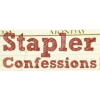
Stapler Confessions
18 Best College Majors for a Lucrative Career
Posted: May 1, 2024 | Last updated: May 1, 2024

Selecting a college major is a crucial decision that can have a significant impact on your future earnings. Your profession’s trajectory will be shaped by the major you choose, and the job you select will determine your potential income. There is a strong correlation between money and career since one often leads to the other. For many people, the choice of major is influenced by the earning potential of that field.

Computer Science
The definition of a Bachelor of Computer Science is a degree focused on algorithmic thinking, problem-solving, and software development. It is tailored to develop the skills and knowledge necessary to create software systems as professionals in the computing industry can design and implement complex software systems with knowledge of platform technologies, architectures, and algorithms.

Electrical Engineering
Electrical engineering encompasses numerous technologies, concepts, and devices, and its work is indispensable to the products and services that many people depend on. Electrical engineering involves designing, deploying, and maintaining electrical systems and electronic control systems. Electrical engineers also design and develop the technology that is the backbone of our telecommunications systems.

Chemical Engineering
Chemical engineers use chemistry and engineering principles to design and optimize processes for producing energy, materials, and chemicals in pharmaceutical industries. A degree in chemical engineering is also a $30,000 per year ticket to a fantastic career.

Finance is a major that focuses mainly on financial analysis, risk management, and investment strategies. Graduates with a degree in finance may pursue careers in investment banking, business or corporate financial analysis, or financial planning, managing money for individuals and their investments.

This career field is in high and increasing demand because of the brave acts of individuals like Andrew Fastow, the former chief financial officer of Enron, and the Government, thanks to the Enron scandal. Because of actions like this, the government had to set guidelines or, as we call them, regulations for all companies to follow called the Sarbanes-Oxley Act of 2002. This, in turn, created the perfect atmosphere for accountants.

Economics majors possess valuable skills that are in high demand and offer good salaries. They learn to analyze events and trends, demystify complex economic concepts and theories, and make decisions using logic and evidence.

When you major in nursing, you learn both the scientific knowledge behind nursing and its practical side. As a nurse, your job is to take care of patients and ensure their happiness. Nurses are also one of the most trusted professions in the world. They are needed in almost every part of the hospital.

Pharmaceuticals
In pharmacy school, students learn much medical terminology, pharmaceutical sciences, pharmacology of drugs, and patient care. When a student graduates from pharmacy school, they have the right to begin a profession in pharmacy by passing the examinations given by the state pharmacy board.

Mechanical Engineering
Majors in Mechanical Engineering fully comprehend mechanics, thermodynamics, and materials science. With that knowledge, they can design and optimize mechanical systems and processes. From engines to manufacturing processes, having this knowledge persuades employers to hire mechanical engineering graduates in fields that are continually developing opportunities and prospering financially.

Physics majors discover universal principles that govern our world. They have a strong foundation in research and analytical skills. The major can be applied to various industries, such as research and development for new technologies. Physicists are always on the cutting edge of technology, leading to good income jobs in academia, etc.

Information Technology (IT)
At a broad level, an IT degree offers exposure to managing and optimizing the digital systems vital to a business or organization’s success. Undoubtedly, reliance on technology is increasing—whether talking about small and medium businesses, healthcare organizations, or K-12 and post-secondary ed.

Chemists study the composition and properties of matter, including the processes and phenomena that occur in it. Chemists also work hard to create new materials and procedures to help better the world—majors in Chemistry work in many fields, including material science, pharmaceuticals, and environmental science. Majoring in Chemistry can lead to jobs as a researcher or developer and is very lucrative.

Petroleum Engineering
Petroleum engineering students learn from the extraction and production of oil and petroleum products. On the part of the energy sector, petroleum engineers are significant contributors to the extraction stages and even to determining the price per barrel of a given consignment.

Aerospace Engineering
Studying Aerospace Engineering prepares you for a career in the aerospace industry. Aerospace engineers design and develop advanced technologies in modern aircraft and spacecraft. An aerospace engineering degree is universally respected but will also give you the tools to go anywhere you want. The aerospace industry is constantly advancing and transforming, providing suitable opportunities for those entering at the professional level.

Mathematics
With their strong analytical and problem-solving skills, majors in Mathematics are highly sought after. Mathematics majors have limitless possibilities and can find job opportunities in finance, technology, research, or data analysis. Mathematicians help to make sound decisions and often earn competitive salaries.

Computer Engineers
Computer engineers bridge the gap between hardware and software. In other words, they’re the guys who construct and build computers and computer systems. Think of computer engineers as electrical engineers who focus solely on computers and the internal networks and processes that enable them to run.

Civil Engineering
Civil Engineering students plan and design much of our infrastructure, including bridges, roads, buildings, and water treatment facilities. Due to their essential role, civil engineers are in high demand. This demand leads to high salaries and the ability to live anywhere in the country.

Biomedical Engineering
Incorporating principles from both engineering and medicine, Biomedical Engineering majors design and develop new medical devices and techniques that facilitate the advancement of medical care and the improvement of overall healthcare outcomes. Biomedical Engineers generally find work within the ever-growing healthcare industry with a good salary.

High-Paying Jobs People Refuse, Even with a $100,000 Monthly Salary
From heart-wrenching responsibilities to perilous undertakings, these jobs poignantly remind us that some tasks remain untouched, even for the promise of a six-figure monthly salary.
High-Paying Jobs People Refuse, Even with a $100,000 Monthly Salary .

Jobs That Are Getting So Hard to Fill, Employers Are Desperate
While millions of people are looking for employment, we examine 14 jobs that employers are finding difficult to fill.
14 Jobs That Are Getting So Hard to Fill, Employers Are Desperate

Scams So Sneaky, You’ll Be Surprised You Fell for Them. Have You?
From internet blackmail to clever diet scams, these ten sneaky tricks expose the surprising ways people have fallen victim to deception.
10 Scams So Sneaky, You’ll Be Surprised You Fell for Them. Have You?
More for You
Barack Obama shares his No. 1 piece of advice for his own daughters: Don't let your hunger for success ruin your happiness
Face of 75,000-year-old Neanderthal woman revealed
I Cut My Food Expenses In Half Using The Viral "6-To-1" Grocery Method — Here's How
How Much Beer You'd Have To Drink To Equal A Single Shot Of Liquor
17 Phrases Confident People Use When They Want to Be Assertive But Not Rude
The most expensive state to live in isn't California or New York, based on data. Here are the top 10.
Employer who fired 78-year-old must now pay her $78,000
A woman said her tattoos got her rejected for a job, but experts say personality is far more important
Jif Is Releasing a New Flavor for the First Time in Nearly 10 Years
Netflix is removing all of these movies and TV shows
5 Of The Most Luxurious Pickup Trucks In 2024
13 "Unspoken Rules" Of Womanhood That Every Female Should Know
Map reveals best places to live in the US if nuclear war breaks out
Vladimir Putin 'alarmed' after Ukrainian diplomat hints at next military move
How much water is too much water? Doctor weighs in
29-year-old ex-bartender now earns $100,000 working in AI without a college degree—here's how
Mountain Dew has been banned in nearly 30 countries. Here's why, plus more American favorites that are illegal elsewhere.
Walton Goggins Acknowledges "Tough Time" With ‘Justified' Co-Star Timothy Olyphant "Towards The End" & Shares Update On Where They Stand Now
Marriage counsellor shares one sign your relationship is really over
Six easy ways to lose an inch from your waist – in a week
United Methodists, at major conference, repeal their church’s longstanding ban on LGBTQ clergy

CHARLOTTE, N.C. (AP) — United Methodist delegates repealed their church’s longstanding ban on LGBTQ clergy with no debate on Wednesday, removing a rule forbidding “self-avowed practicing homosexuals” from being ordained or appointed as ministers.
Delegates voted 692-51 at their General Conference — the first such legislative gathering in five years. That overwhelming margin contrasts sharply with the decades of controversy around the issue. Past General Conferences of the United Methodist Church had steadily reinforced the ban and related penalties amid debate and protests, but many of the conservatives who had previously upheld the ban have left the denomination in recent years, and this General Conference has moved in a solidly progressive direction.
Applause broke out in parts of the convention hall Wednesday after the vote. A group of observers from LGBTQ advocacy groups embraced, some in tears. “Thanks be to God,” said one.
The change doesn’t mandate or even explicitly affirm LGBTQ clergy, but it means the church no longer forbids them. It’s possible that the change will mainly apply to U.S. churches, since United Methodist bodies in other countries, such as in Africa, have the right to impose the rules for their own regions. The measure takes effect immediately upon the conclusion of General Conference, scheduled for Friday.
The consensus was so overwhelmingly that it was rolled into a “consent calendar,” a package of normally non-controversial measures that are bundled into a single vote to save time.
Also approved was a measure that forbids district superintendents — a regional administrator — from penalizing clergy for either performing a same-sex wedding or for refraining from performing one. It also forbids superintendents from forbidding or requiring a church from hosting a same-sex wedding.
That measure further removes scaffolding around the various LGBTQ bans that have been embedded various parts of official church law and policy. On Tuesday, delegates had begun taking steps to dismantle such policies.
Delegates are also expected to vote as soon as today on whether to replace their existing official Social Principles with a new document that no longer calls the “practice of homosexuality … incompatible with Christian teaching” and that now defines marriage as between “two people of faith” rather than between a man and a woman.
The changes are historic in a denomination that has debated LGBTQ issues for more than half a century at its General Conferences, which typically meet every four years. On Tuesday, delegates voted to remove mandatory penalties for conducting same-sex marriages and to remove their denomination’s bans on considering LGBTQ candidates for ministry and on funding for gay-friendly ministries.
About 100 LGBTQ people and allies gathered outside the Charlotte Convention Center after the vote — many with rainbow-colored scarves and umbrellas — to celebrate, pray and sing praise songs accompanied by a drum.
Bishop Karen Oliveto, the first openly lesbian bishop in the United Methodist Church, was among those celebrating.
“It seemed like such a simple vote, but it carried so much weight and power, as 50 years of restricting the Holy Spirit’s call on people’s lives has been lifted,” said Oliveto, of the Mountain Sky Episcopal Area, which includes Colorado, Montana, Utah and Wyoming. “People can live fully into their call without fear. The church we’ve loved has found a home for us.”
Angie Cox, an observer at the meeting from Ohio, said she has gone before her conference’s board of ordained ministry six times but was “told no just because of the prohibition on LGBTQ clergy.” She said Wednesday’s vote “means I might be able finally to live fully into my calling.”
Tracy Merrick, a delegate from Pittsburgh who has advocated for LGBTQ inclusion at several previous conferences, said with emotion that there were “many times when I thought we would never see this day.”
The vote, he said, enables the church to become “the denomination that many of us had envisioned for years.”
At the same time, the vote comes following the departure of one-quarter of the U.S. churches within the UMC. And it could also prompt departures of some international churches, particularly in Africa, where more conservative sexual values prevail and where same-sex activity is criminalized in some countries.
Last week, the conference endorsed a regionalization plan that essentially would allow the churches of the United States the same autonomy as other regions of the global church. That change — which still requires local ratification — could create a scenario where LGBTQ clergy and same-sex marriage are allowed in the United States but not in other regions.
More than 7,600 mostly conservative congregations in the United States disaffiliated between 2019 and 2023 reflecting dismay over the denomination not enforcing its bans on same-sex marriage and LGBTQ ordination.
The conference last week also approved the departure of a small group of conservative churches in the former Soviet Union.
The church’s 1972 General Conference approved a statement in its non-binding Social Principles that homosexuality is “incompatible with Christian teaching” — a phrase omitted in a revision to the Social Principles that is also headed for a conference vote this week.
The now-repealed ban on clergy who are “self-avowed practicing homosexuals” was originally enacted in 1984, when the conference also voted to require “fidelity in marriage and celibacy in singleness.”
The denomination had until recently been the third largest in the United States, present in almost every county. But its 5.4 million U.S. membership in 2022 is expected to drop once the 2023 departures are factored in.
The denomination also counts 4.6 million members in other countries, mainly in Africa, though earlier estimates have been higher.
Associated Press religion coverage receives support through the AP’s collaboration with The Conversation US, with funding from Lilly Endowment Inc. The AP is solely responsible for this content.
Copyright 2024 The Associated Press. All rights reserved.

Man killed in early morning motorcycle crash

Landlord accused of raping two children

Dispatch urges caution after crash with entrapment

Traffic resumes following morning crash

Sheriff's office warning residents of scam social media post
Latest news.

2024 1A-2 Baseball Regional: Armorel beats Viola in quarterfinals

2024 1A-2 Softball Regional: Viola beats Hillcrest in quarterfinals

2024 1A-2 Baseball Regional: Marked Tree falls to West Side Greers Ferry in quarterfinals

2024 1A-2 Softball Regional: Marked Tree falls to West Side Greers Ferry in quarterfinals

2024 1A-2 Softball Regional: Mammoth Spring falls to Shirley in quarterfinals
Jurors in Trump hush money trial hear recording of pivotal call on plan to buy affair story
NEW YORK (AP) — Jurors in the hush money trial of Donald Trump heard a recording Thursday of him discussing with his then-lawyer and personal fixer a plan to purchase the silence of a Playboy model who has said she had an affair with the former president.
A visibly irritated Trump leaned forward at the defense table, and jurors appeared riveted as prosecutors played the September 2016 recording that attorney Michael Cohen secretly made of himself briefing his celebrity client on a plan to buy Karen McDougal’s story of an extramarital relationship.
Though the recording surfaced years ago, it is perhaps the most colorful piece of evidence presented to jurors so far to connect Trump to the hush money payments at the center of his criminal trial in Manhattan. It followed hours of testimony from a lawyer who negotiated the deal for McDougal’s silence and admitted to being stunned that his hidden-hand efforts might have contributed to Trump’s White House victory.
“What have we done?” attorney Keith Davidson texted the then-editor of the National Enquirer, which had buried stories of sexual encounters to prevent them surfacing in the final days of the bitterly contested presidential race. “Oh my god,” came the response from Dylan Howard.
“There was an understanding that our efforts may have in some way...our activities may have in some way assisted the presidential campaign of Donald Trump,” Davidson told jurors, though he acknowledged under cross-examination that he dealt directly with Cohen and never Trump.
The testimony from Davidson was designed to directly connect the hush money payments to Trump’s presidential ambitions and to bolster prosecutors’ argument that the case is about interference in the 2016 election rather than simply sex and money. Manhattan District Attorney Alvin Bragg has sought to establish that link not just to secure a conviction but also to persuade the public of the significance of the case, which may be the only one of four Trump prosecutions to reach trial this year.
“This is sort of gallows humor. It was on election night as the results were coming in,” Davidson explained. “There was sort of surprise amongst the broadcasters and others that Mr. Trump was leading in the polls, and there was a growing sense that folks were about ready to call the election.”
Davidson is seen as a vital building block for the prosecution’s case that Trump and his allies schemed to bury unflattering stories in the run-up to the 2016 presidential election. He represented both McDougal and porn actor Stormy Daniels in negotiations that resulted in the purchase of rights to their claims of sexual encounters with Trump and those stories getting squelched, a tabloid industry practice known as “catch-and-kill.”
Davidson is one of multiple key players testifying in advance of Cohen, the star prosecution witness who paid Daniels $130,000 for her silence and also recorded himself, weeks before the election, telling Trump about a plan to purchase the rights to McDougal’s story from the National Enquirer so it would never come out. The tabloid had previously bought McDougal’s story to bury it on Trump’s behalf.
At one point in the recording, Cohen revealed that he had spoken to then-Trump Organization Chief Financial Officer Allen Weisselberg about “how to set the whole thing up with funding.” To which Trump can be heard responding: “What do we got to pay for this? One-fifty?”
Trump can be heard suggesting that the payment be made with cash, prompting Cohen to object by saying “no” multiple times. Trump can then be heard saying “check” before the recording cuts off.
Trump’s lawyers sought earlier in the day to blunt the potential harm of Davidson’s testimony by getting him to acknowledge that he never had any interactions with Trump — only Cohen. In fact, Davidson said, he had never been in the same room as Trump until his testimony.
He also said he was unfamiliar with the Trump Organization’s record-keeping practices and that any impressions he had of Trump himself came through others.
“I had no personal interactions with Donald Trump. It either came from my clients, Mr. Cohen or some other source, but certainly not him,” Davidson said.
The line of questioning from Trump attorney Emil Bove appeared intended to cast Trump as removed from the negotiations and to suggest that Cohen was handling the hush-money matters on his own.
Bove also noted that Davidson had been involved in similar payments for clients that had nothing to do with presidential politics, grilling him about previous instances in which he solicited money to suppress embarrassing stories, including one involving wrestler Hulk Hogan.
By the time Davidson negotiated hush money payments for McDougal and Daniels, he was “pretty well versed in coming right up to the line without committing extortion, right?” Bove asked
“I had familiarized myself with the law,” Davidson replied.
Also Thursday, jurors viewed a confidential agreement requiring Daniels to keep quiet about her claims that she had a tryst with the married Trump a decade earlier. The agreement, dated less than two weeks before the 2016 presidential election, called for her to receive $130,000 in exchange for her silence.
The money was paid by Cohen, and the agreement referred to both Trump and Daniels with pseudonyms: David Dennison and Peggy Peterson.
“It is understood and agreed that the true name and identity of the person referred to as ‘DAVID DENNISON’ in the Settlement Agreement is Donald Trump,” the document stated, with Trump’s name written in by hand.
After the payment was made, Trump’s company reimbursed Cohen and logged the payments to him as legal expenses, prosecutors have said in charging the former president with 34 felony counts of falsifying business records — a charge punishable by up to four years in prison.
While testifying Thursday, Davidson also recalled Cohen ranting to him about Trump in a phone conversation about a month after the 2016 election, complaining that he had been passed over for a job in the new administration and that Trump had yet to reimburse him for the Daniels payment.
He also recalled Cohen telling him that he and Trump were “very upset” when The Wall Street Journal published an article that exposed a separate $150,000 National Enquirer arrangement with McDougal, who has said she and Trump had an affair, just days before the election.
“He wanted to know who the source of the article was, why someone would be the source of this type of article. He was very upset about the timing,” Davidson said of Cohen. “He stated that his boss was very upset, and he threatened to sue Karen McDougal.”
Trump has pleaded not guilty and denied relationships with either woman, as well as any wrongdoing in the case.
Before the start of testimony, prosecutors requested $1,000 fines for each of four comments by Trump that they say violated a judge’s gag order barring him from attacking witnesses, jurors and others closely connected to the case. Such a penalty would be on top of a $9,000 fine that Judge Juan M. Merchan imposed Tuesday related to nine separate violations that he found.
Merchan did not immediately rule on the request for fresh sanctions, though he indicated he was not particularly concerned about one of the four statements flagged by prosecutors.
The prospect of further punishment underscores the challenges Trump the presidential candidate faces in adjusting to the role of criminal defendant subject to rigid courtroom protocol that he does not control. It also remains to be seen whether any rebuke from the court will lead Trump to adjust his behavior given the campaign trail benefit he believes he derives from painting the case as politically motivated.
Copyright 2024 The Associated Press. All rights reserved.

Looking for a home in Lexington? Coach Cal’s house is now on the market!

Judge bars former Ky. Gov. Matt Bevin from wife’s home

Person hit, killed while walking on interstate in Lexington

Person robbed in Lexington McDonald’s drive-thru

Lexington firefighter arrested
Latest news.

Arizona’s Democratic governor signs a bill to repeal 1864 ban on most abortions

Maryland officials release timeline, cost estimate, for rebuilding bridge

Prosecutors play call between Michael Cohen and Trump

Lexington teacher who spent over a year hospitalized dies
Petroleum tanker fire shuts down major interstate
NORWALK, Conn. ( WFSB /Gray News) - A petroleum tanker fire shut down both sides of Interstate 95 in Connecticut Thursday morning.
Now the plan is to take down the overpass in order to open the interstate back up.
The Connecticut Department of Transportation said the crash involved three vehicles, including the tanker and another tractor-trailer in Norwalk at about 5:30 a.m.
Flames and smoke were seen after the crash as the tanker burned underneath the Fairfield Avenue overpass.
The overpass was shut down as a result of the crash and the Norwalk fire chief said crews plan to take down the overpass so that the interstate can be reopened.
The Department of Energy and Environmental Protection said the tanker carried 8,500 gallons of gasoline. The department confirmed that some fuel did make it into the water and a boom operation was set up.
“The catch basin system which runs along I-95 drains into Norwalk Harbor, so marine units, both private and from various police and fire departments, are in the water preparing for the possibility of product from the accident reaching the water,” said Paul Copleman, DEEP spokesperson.
Major delays were reported in the area as traffic was detoured off the interstate in both directions. Traffic on local roads has also been impacted.
One man reported abruptly being met with chaos as soon as he opened his door.
“It’s a lot to process,” Charles, a neighbor who did not provide his last name, said. “I’ve never seen, I didn’t even know the wires were on the bridge. I’m like ‘Wow, so it’s affecting the traffic a lot.’”
Minor injuries have been reported in connection to the incident. The cause of the crash has yet to be determined.
Copyright 2024 WFSB via Gray Media Group, Inc. All rights reserved.

School closures announced

3 tornadoes confirmed in SWLA; power outages remain after severe storms

SWLA school closures

Man accused of breaking into Jennings High caught after hours-long manhunt; school to resume Tuesday

Final decision handed down on former Barbe baseball star’s expulsion
Latest news.

More than 2,100 people have been arrested during pro-Palestinian protests on US college campuses

Arizona’s Democratic governor signs a bill to repeal 1864 ban on most abortions

Maryland officials release timeline, cost estimate, for rebuilding bridge

FIRST ALERT WEATHER DAY DECLARED: More rain likely Friday, but uncertainty exists on when it arrives

Jurors in Trump hush money trial hear recording of pivotal call on plan to buy affair story

IMAGES
COMMENTS
For example, if you earn a bachelor's degree in education and another in mathematics, you might list it as: Bachelor of Science: Education and Mathematics. 4. List your minor. Minors go on the same line, if possible, with your major and a comma separates them. Minors are always formatted the same.
Follow these steps to list your college major and minor on your resume. 1. First, create an education section. Add an education section to your resume by creating a separate heading. Suppose you are a recent graduate or have limited relevant work experience. In that case, put your education section near the top of the resume before your ...
Enthusiastic college student majoring in education seeking a teaching assistant internship. Skilled at instructing small groups and passionate about student development. Eager to gain classroom experience and work collaboratively with faculty. 3. Swap out "Work History" for "Relevant Experience".
9 college resume tips. When writing a resume for a job application as a college student or recent graduate, consider these tips: 1. Choose the right resume format. Potential employers spend a short amount of time looking at your resume—usually only several seconds. The easier your resume is to scan, the better you can hold their attention.
Below is an example to review: Jon Menken-Patel 555-112-3344 | [email protected] | Cleveland, Ohio | jonmenkenpatel.portfolio.net Professional Summary First-year architecture Honors College student at Randenberry State University with Dean's List status and a 4.0 in-major grade point average (GPA). State champion athlete with 13 years of ice ...
How to list a bachelor's degree on a resume. You should list your bachelor's degree along with your university's name, dates of study, major, GPA (if a 3.5 or above), minor (if applicable), and honors and relevant coursework. Similar to an associate's degree, there are numerous ways to abbreviate different types of bachelor's degrees.
Top ↑ College Freshman Resume Write Your College Freshman Resume With This Step-By-Step Guide #1. Format Your College Freshman Resume the Right Way #2. Add Your Contact Details #3. Write a College Freshman Resume Objective #4. Prioritize Your Education #5.
Major and level of degree. College name. Location of the school (including the city and state) Expected graduation date (both the month and year) Your GPA (but only if it's above 3.0) Any awards or honors. Also include the dean's list on your resume if you've made the list during your freshman year.
A resume summary is a 2-4 sentence summary of your professional experiences and achievements. College Student Resume Summary Example: Dependable marketing sophomore with 1 year part-time experience in a marketing internship to oversee marketing campaigns that maximise profit.
Step 3. Add your accurate information by section on your resume for college. Reference the college resume examples you reviewed previously to choose the sections you will use on your high school resume. Organize each list by year, placing the most recent item at the top of your resume for college.
College Student Resume: Examples of Summaries. right. Personable and dependable finance sophomore at SUNY with 1 year part-time experience in an accountancy internship. Top customer satisfaction score (98%) and instrumental in bringing in over 500 new clients because of campus outreach efforts.
Put it either before or after the experience section (depending on your experience). List all your degrees in the education section of your resume. Put your degrees on a resume in the reverse-chronological order. Consider adding extra information about your degree on a resume (e.g. GPA, Latin honors, coursework, etc.).
Sample college student resume objectives. "Recent college graduate with a degree in marketing looking for a full-time role where I can utilize my experience in social media and paid advertising to help an up-and-coming brand like Club Z! Inc. spread awareness and acquire more users.".
Include the education section to your resume and place it before the experience section to be easily seen. Include the name of the college and location, degrees earned (major and minor), and graduation date. Include information on your major. If you hold a double major make sure you list your primary major first.
Acceptable margins are usually between one and 0.7 inches. Pick a readable font, like Arial, Calibri, or Times New Roman, and try not to go below font size 11. As a college student, stick to a one-page resume. However, you should consider keeping a longer version (called a master resume) for your own personal use.
#2. Write an Attention-Grabbing College Resume Objective. A resume objective is a 2-3 sentence long paragraph that should communicate your motivation for getting into college or for studying a specific major.. As such, a well-crafted resume objective can instantly attract admission officers to read the rest of your college application resume.
Apply the resume format guidelines —margins, fonts, 1 page, reverse chronological. Use our cheatsheet college freshman resume sample and add your own information. Ace your college freshman job description with achievements and numbers. Split up certifications, skills and other bonus sections properly.
Type section headers in a larger font, and either bold or underline them. Once you have completed the document, save it as a PDF to ensure that it keeps your original format and layout. A well-written student college resume is the first step in starting a successful career. We will show you how to write a college resume that stands out from the ...
Resume and CV Samples. These sample resumes, CVs, and resources serve as examples to assist students and alumni with crafting their own documents. They are organized first by college and then by major, job type, or other category. After you've crafted your resume or CV, we encourage you to have it reviewed by the Career Center staff.
Here are three expert tips for assembling the perfect job application as a recent college graduate: 1. Highlight your experience as a student. As a fresh graduate, your college education is your biggest asset in entering the job market. Employers understand that earning a degree requires a variety of marketable skills.
The main elements that your MBA resume should include are an education section, a job experience or professional experience section, and a portion that details a bit more about you, personally ...
Chemical Engineering. Chemical engineers use chemistry and engineering principles to design and optimize processes for producing energy, materials, and chemicals in pharmaceutical industries. A ...
Pro-Palestinian protests escalate on college campuses. Hundreds of students have been arrested on college campuses across the country as pro-Palestinian protests continue to spread. Columbia ...
Delegates voted 692-51 at their General Conference — the first such legislative gathering in five years. That overwhelming margin contrasts sharply with the decades of controversy around the issue.
Here's an example of how to list an unfinished degree on your resume: SYRACUSE UNIVERSITY - Syracuse, NY. 2017-2019. If you took some courses related to the job, include those under your university information. You can list them by individual courses taken or by number of credits earned in a certain area of study.
Donald Trump faces the prospect of additional sanctions in his hush money trial as he returns to court for another contempt hearing followed by testimony from a lawyer who represented two women ...
Here's an example of how you can include honors with your double major on a resume: 6. List any coursework relevant to the job. If you have coursework that's relevant to the job you're applying to, you can also include this relevant coursework on your resume under the respective major.
NORWALK, Conn. (WFSB/Gray News) - A petroleum tanker fire shut down both sides of Interstate 95 in Connecticut Thursday morning.Now the plan is to take down the overpass in order to open the interstate back up. The Connecticut Department of Transportation said the crash involved three vehicles, including the tanker and another tractor-trailer in Norwalk at about 5:30 a.m.